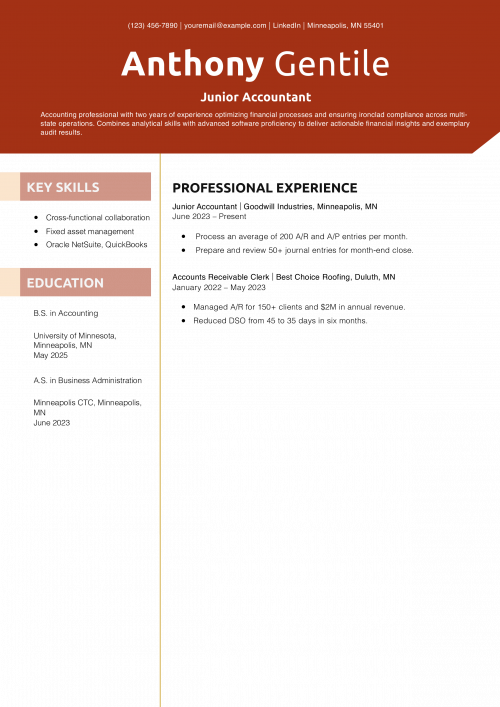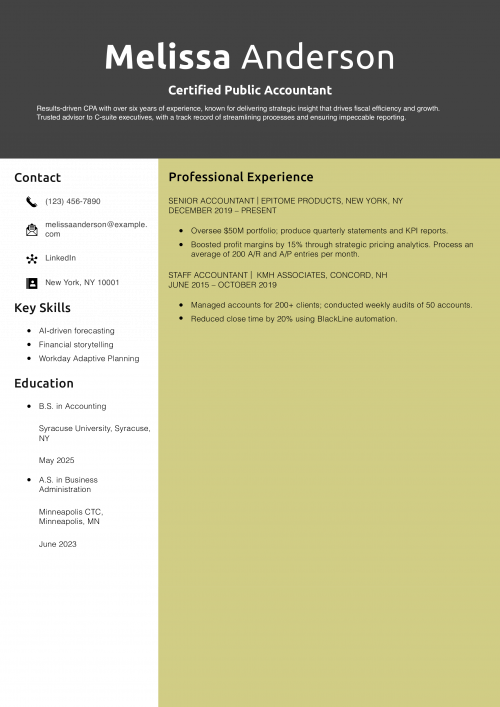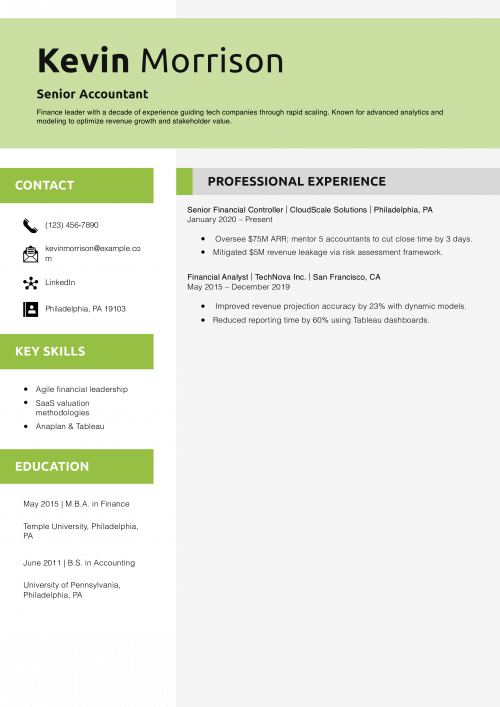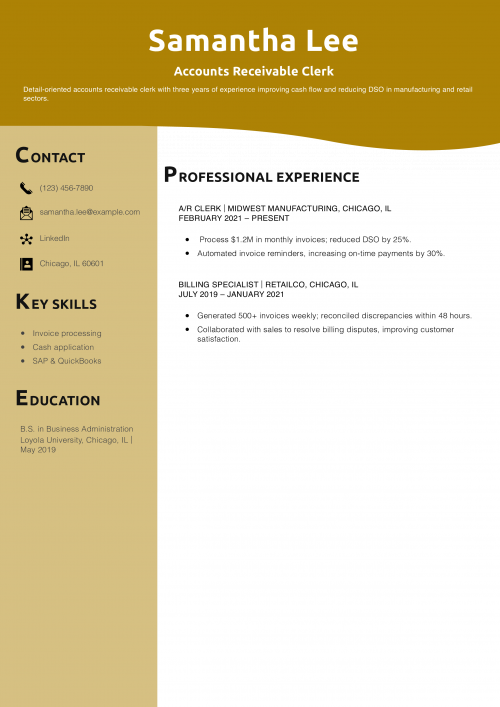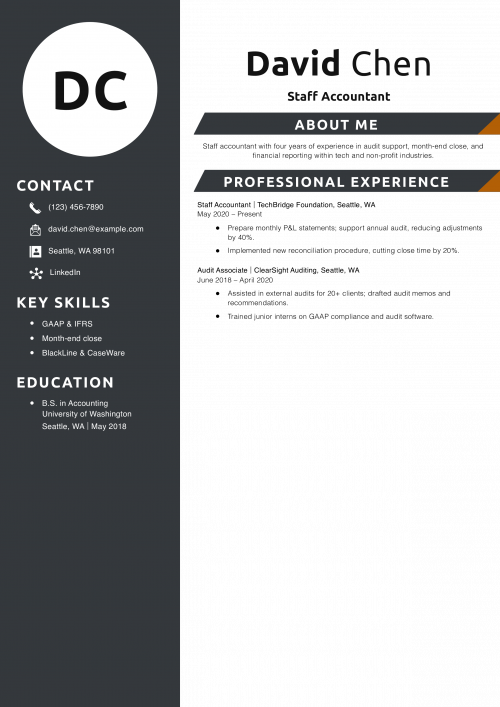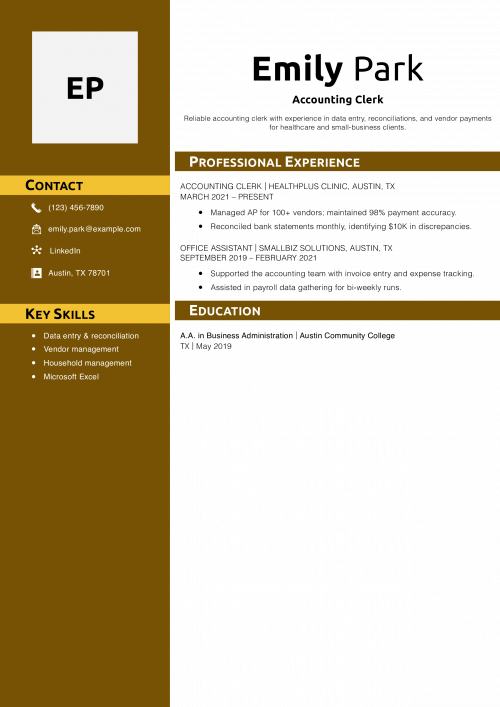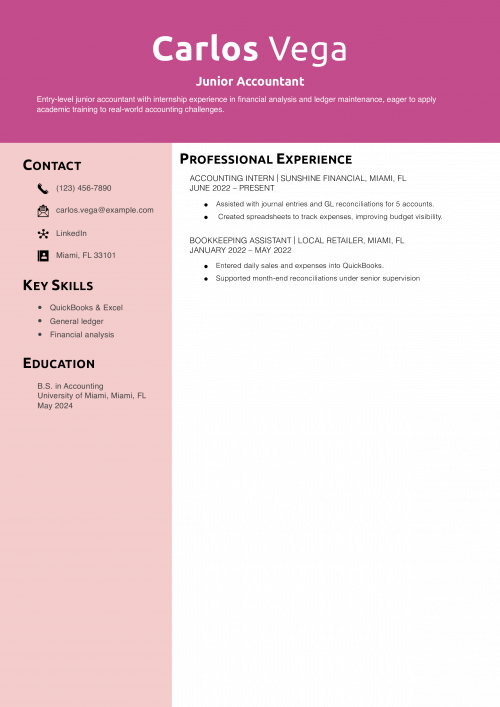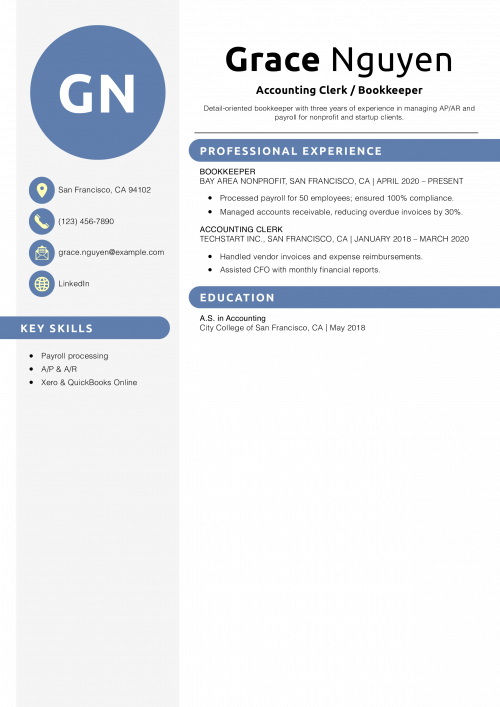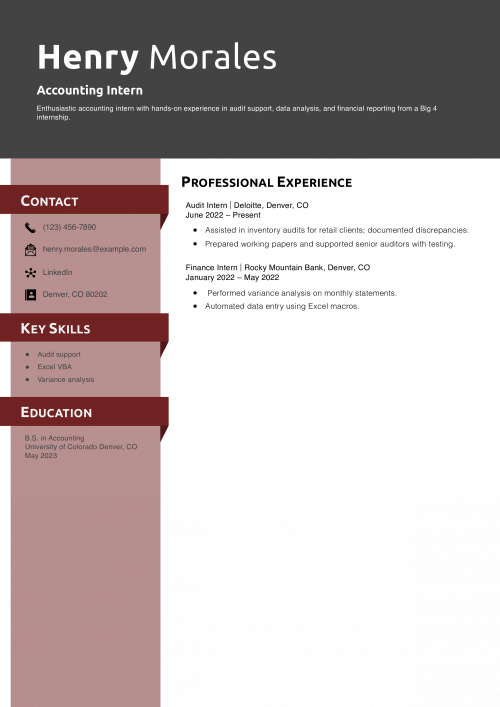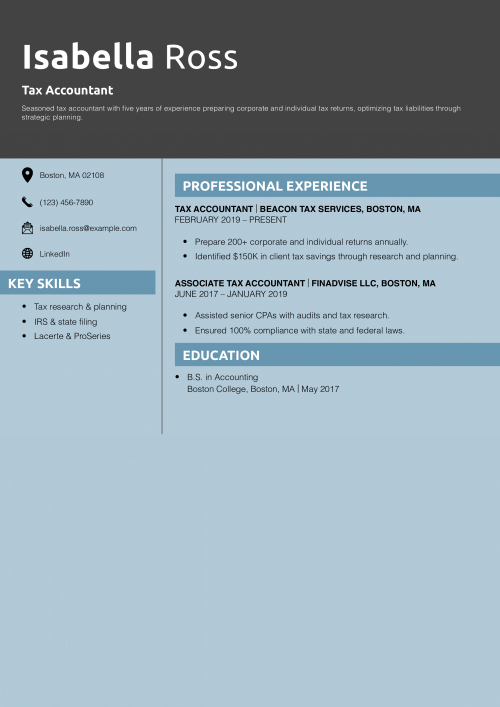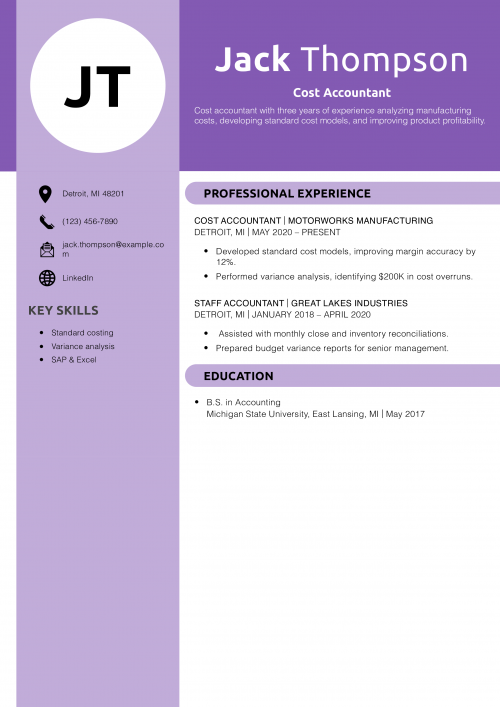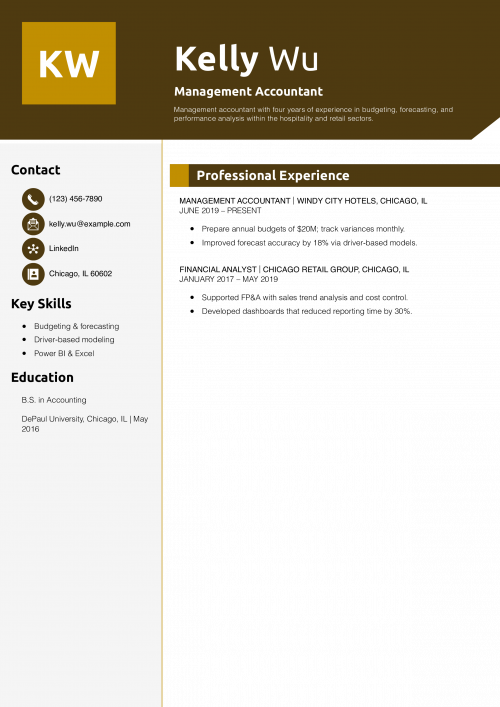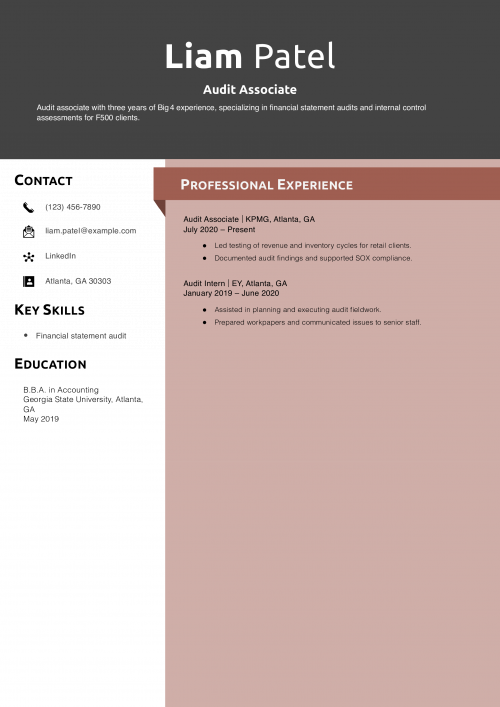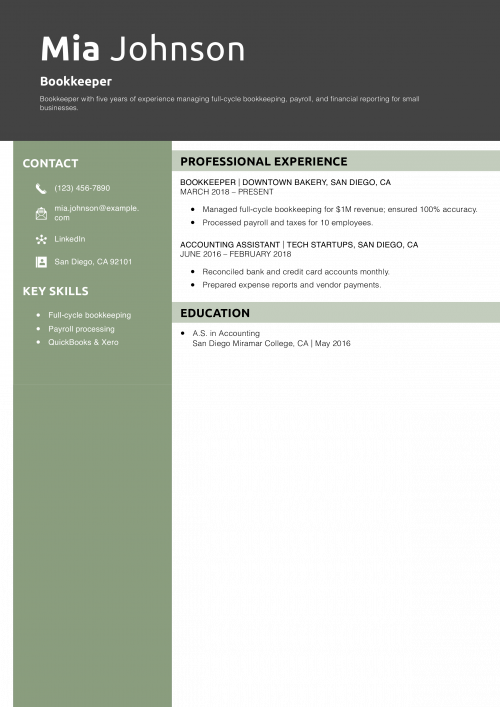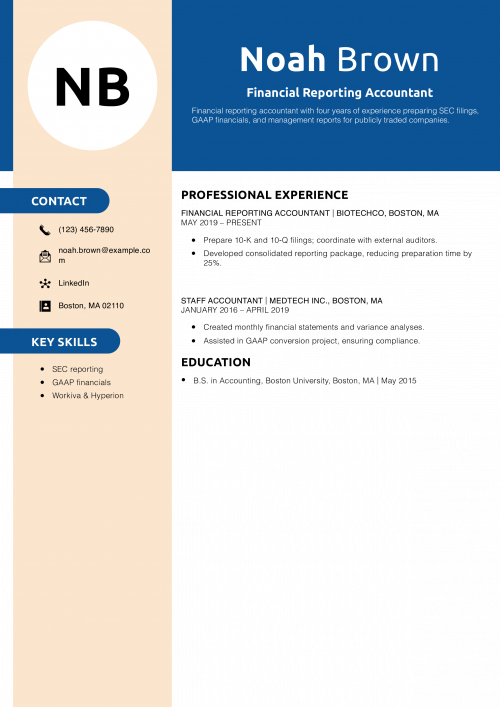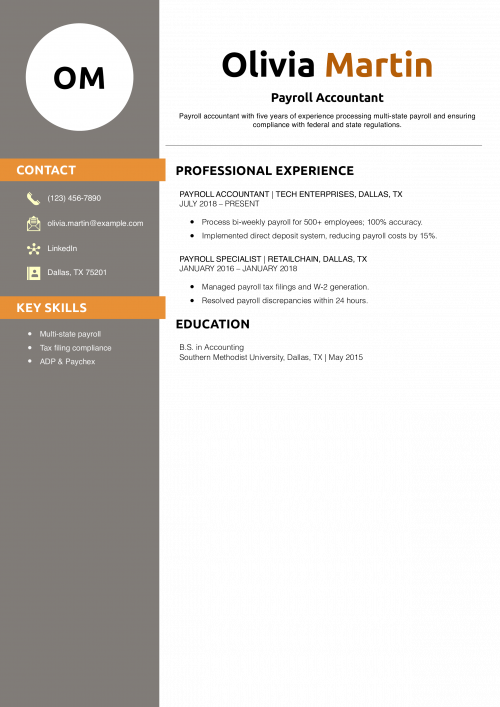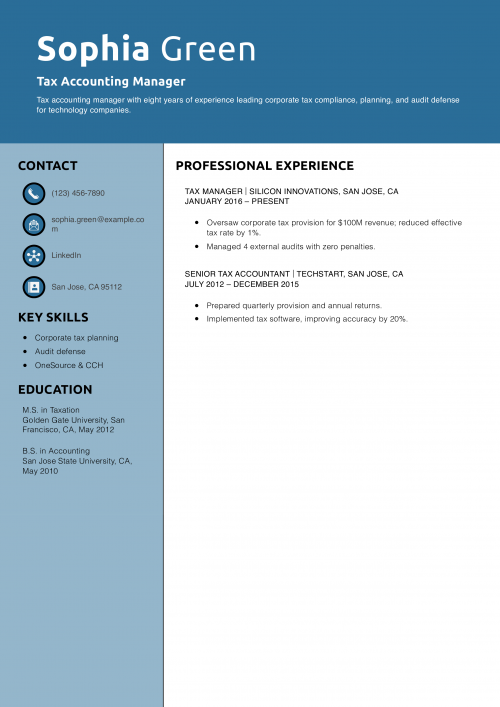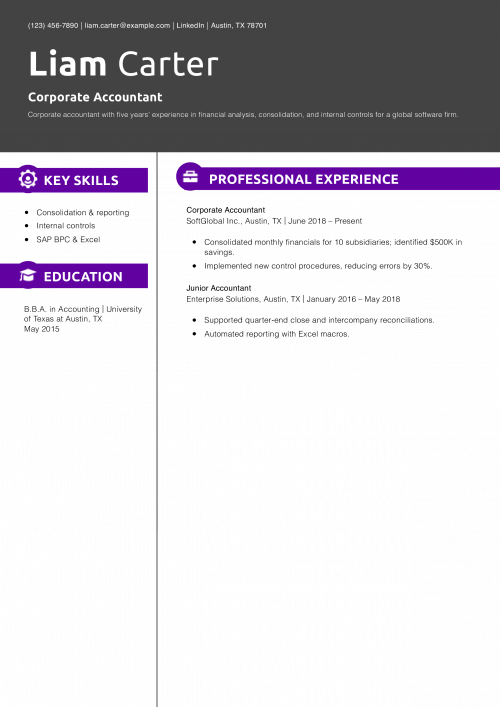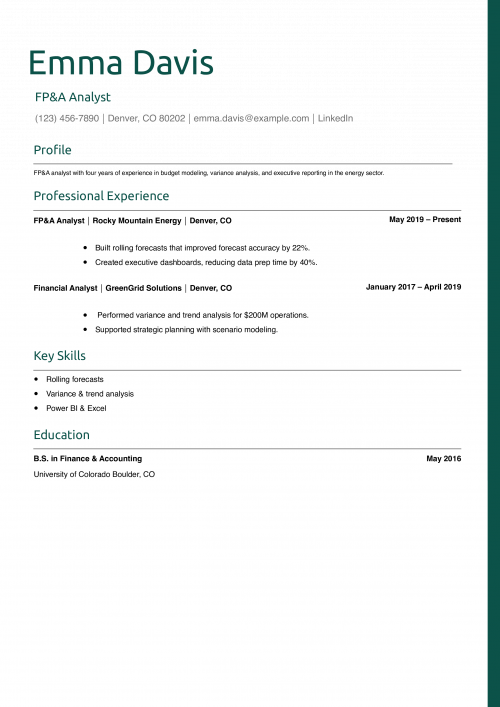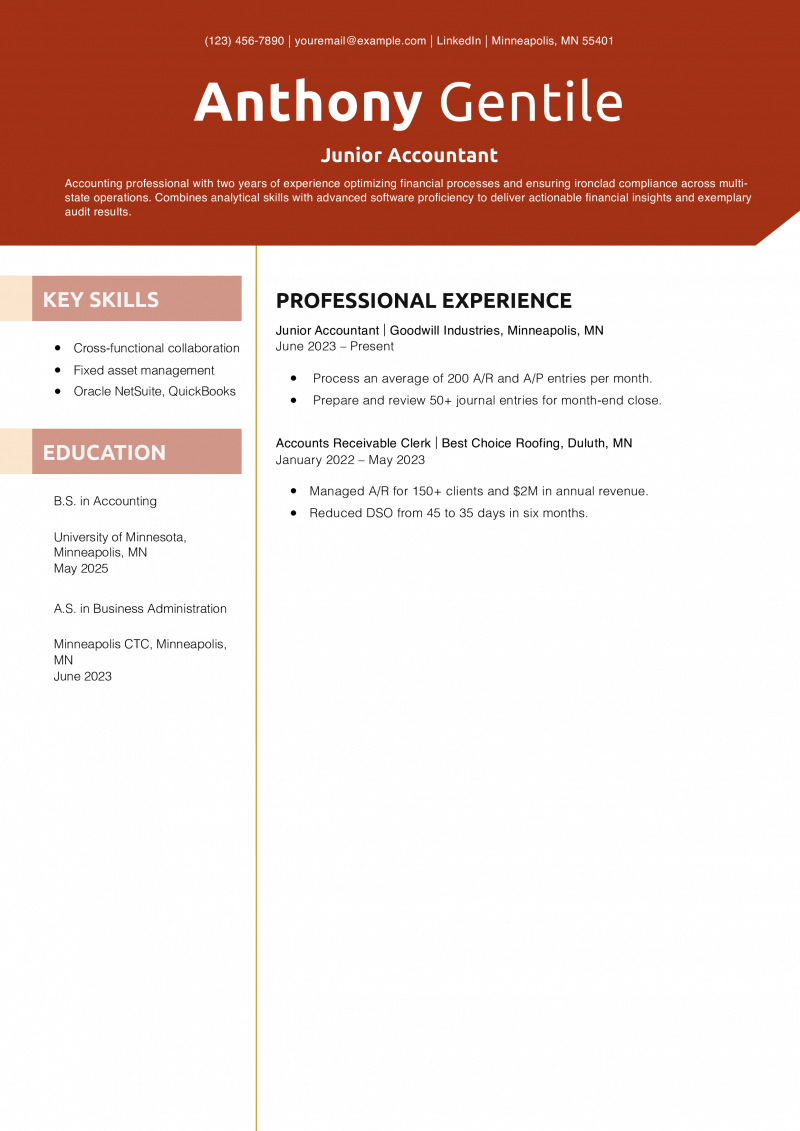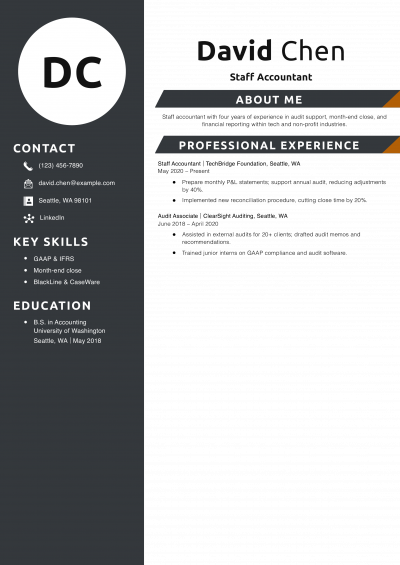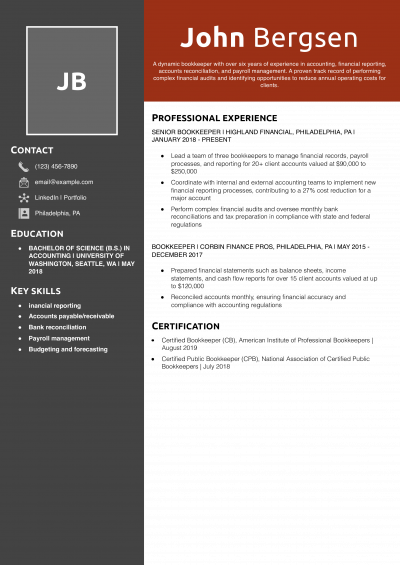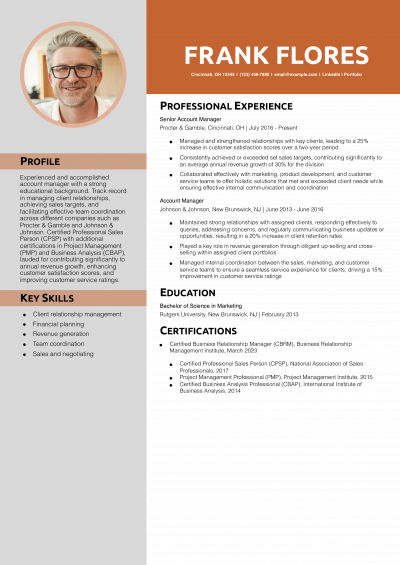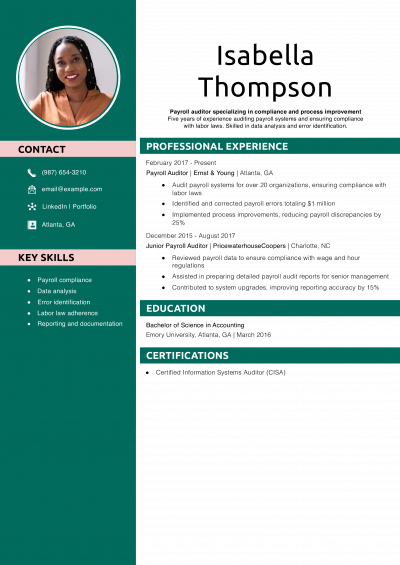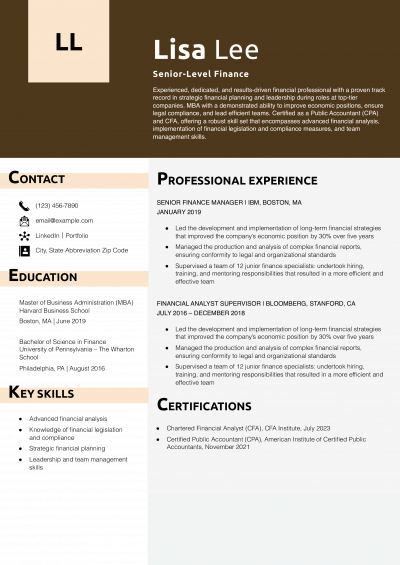Your accountant resume should demonstrate your financial competency, attention to detail, diligence, and knowledge of accounting best practices. Hiring managers need to know you can handle the demands of complex financial reporting within their organization. We’ll help you craft a resume that shows you can manage financial data effectively and provide valuable insight for informed business decision-making.
Key takeaways:
- Highlight specializations: Do you specialize in taxes, auditing, or forensic accounting? Mention that immediately in your profile. This will capture the attention of hiring managers, especially if it’s relevant to the job you’re applying for.
- Quantify financial impact: As an expert with numbers, you know they can tell a lot about someone’s performance. When describing past experience, use numbers, metrics, and dollar amounts to illustrate things like cost savings or improvements in processes.
- Optimize for ATS: Identify accounting keywords from the job description and work them into your resume organically. Aligning your resume with the employer’s needs will help it perform better within Applicant Tracking Systems (ATS).
Accountant Resume Examples and Templates (Downloadable)
Junior Accountant Resume Example
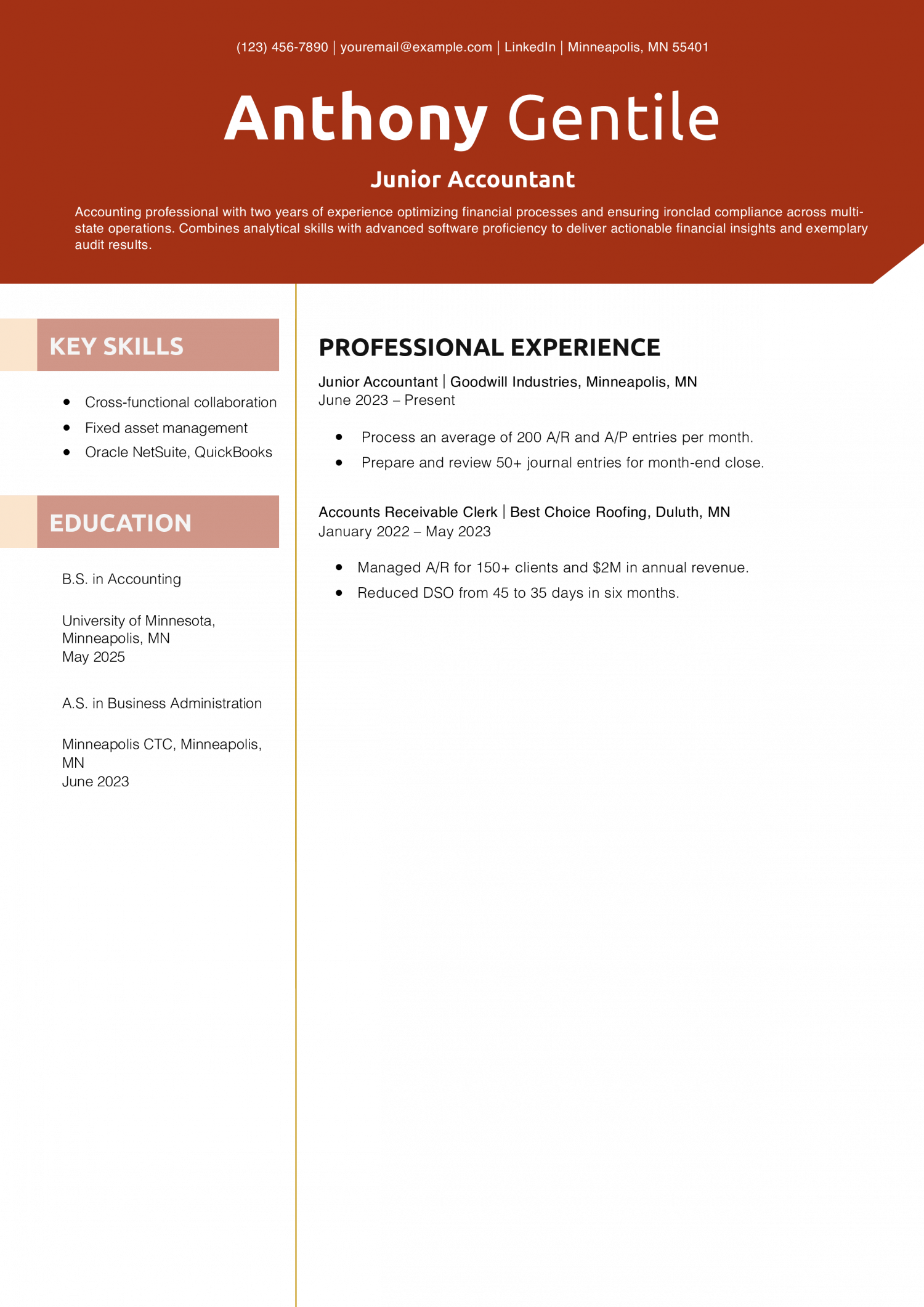
Why This Resume Is a Great Example
Anthony’s resume effectively balances hands‑on accounting duties with measurable improvements in DSO and audit success.
Expert Tip: Use metrics to showcase your process improvements and software proficiency. For more tips, see Best Resume Formats.
Certified Public Accountant Resume Example
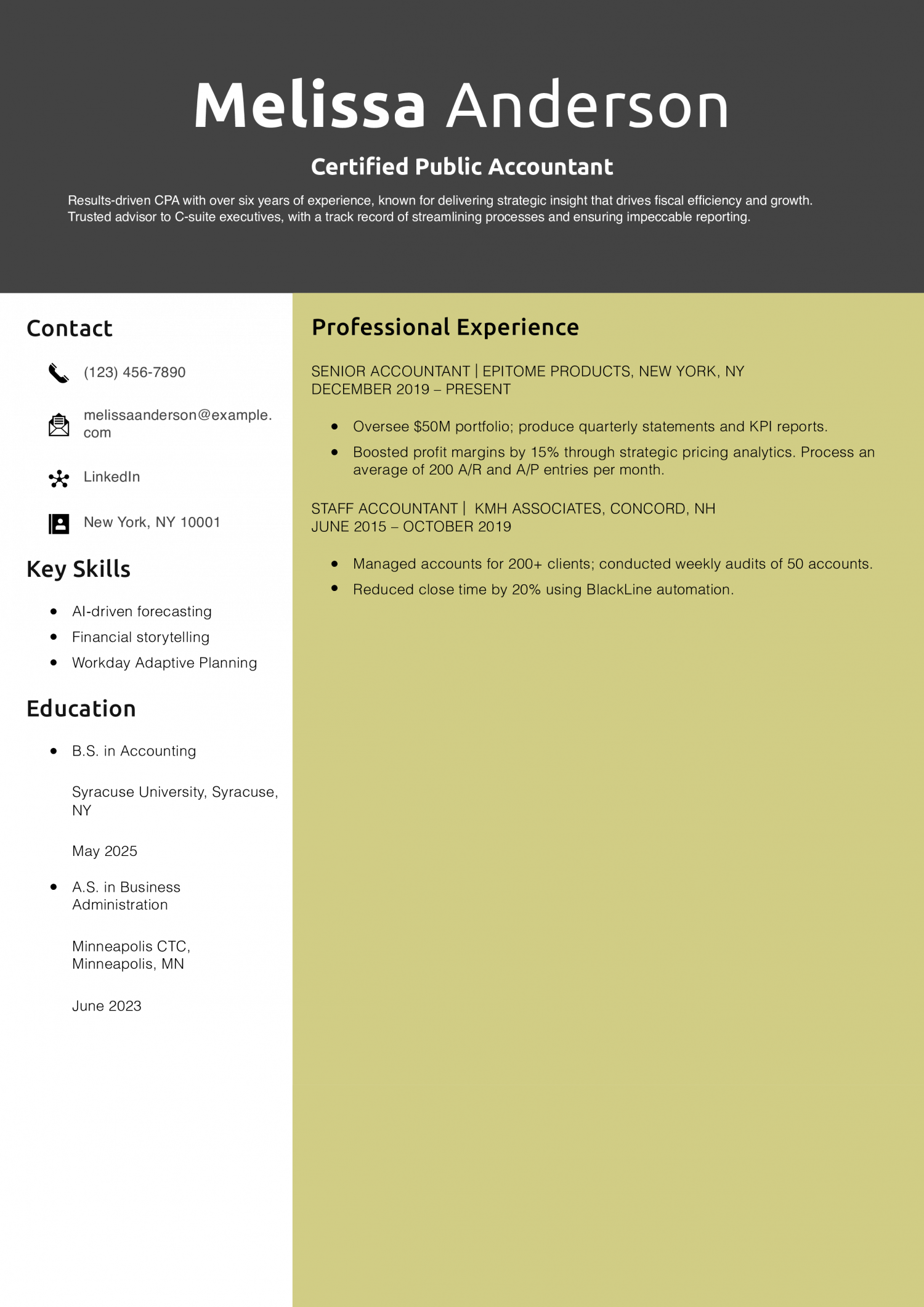
Why This Resume Is a Great Example
Melissa’s resume combines high‑level strategic achievements with technical mastery of forecasting and reporting tools.
Expert Tip: Emphasize your leadership in process automation and forecasting accuracy. For more tips, see How to Write a Resume Summary.
Senior Accountant Resume Example
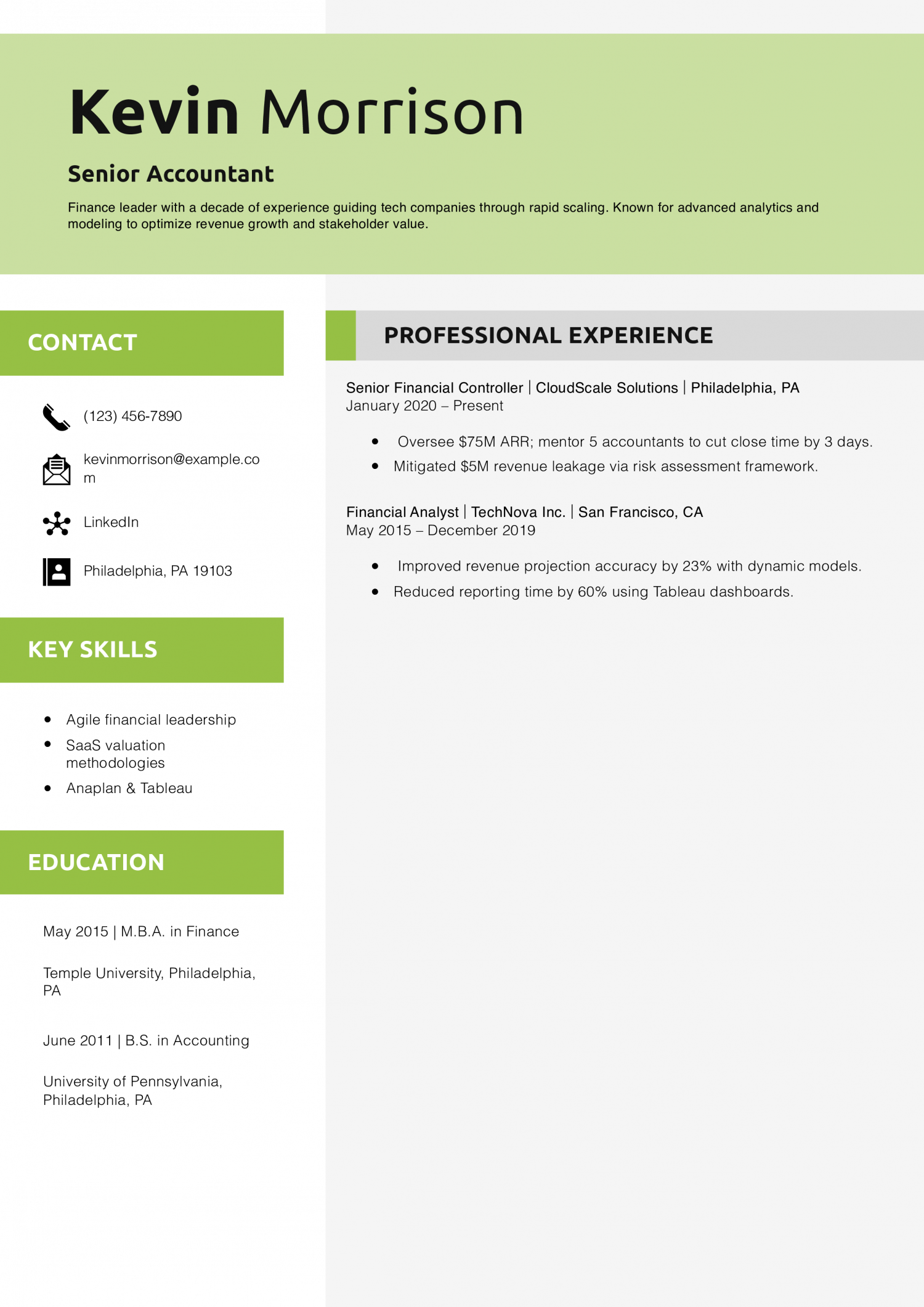
Why This Resume Is a Great Example
Kevin’s resume highlights his strategic leadership in high‑growth SaaS forecasting and process optimization.
Expert Tip: Showcase your modeling techniques and stakeholder results. For more tips, see How to Tailor a Resume to a Job Description.
Accounts Receivable Clerk Resume Example
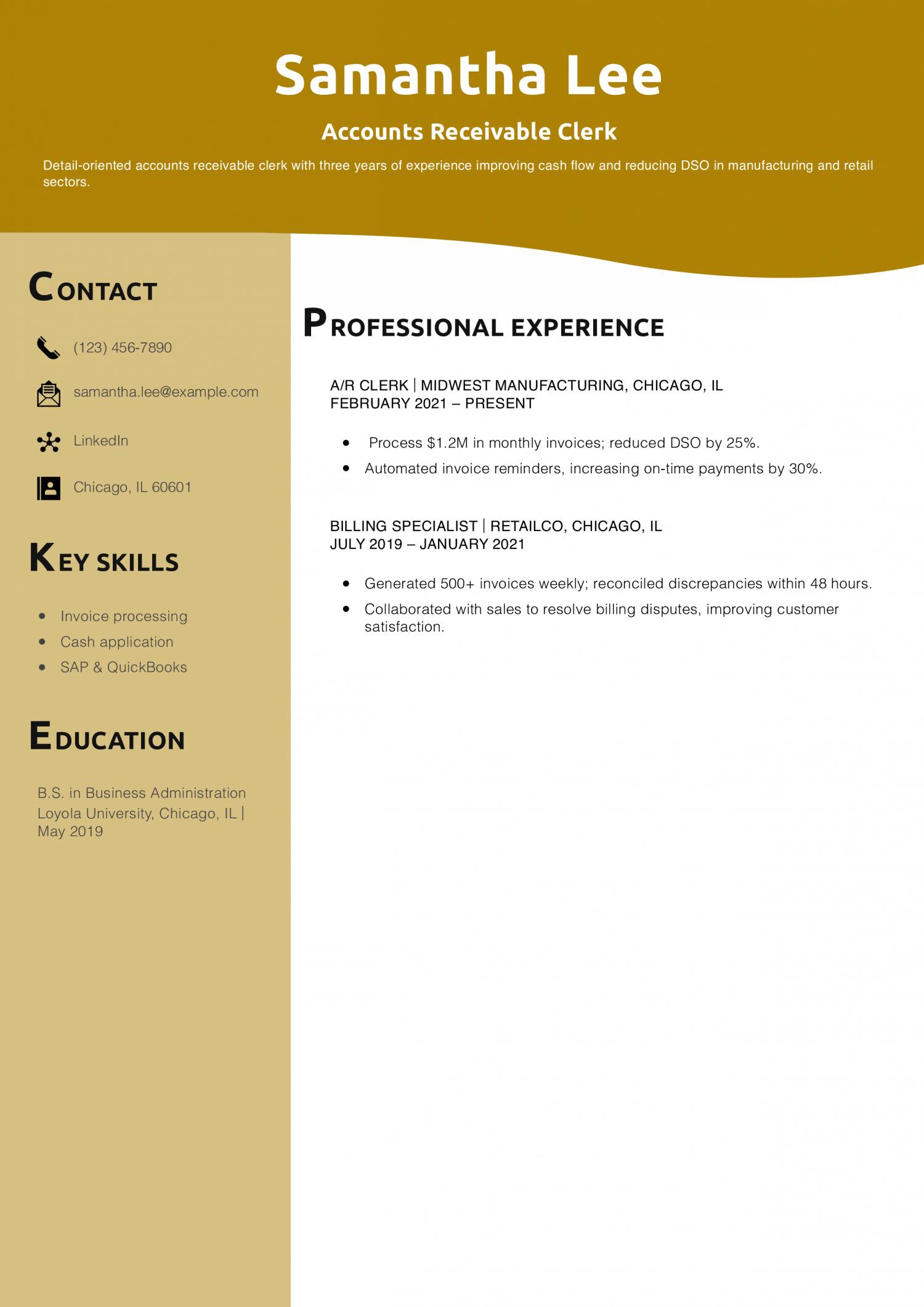
Why This Resume Is a Great Example
Samantha’s resume effectively demonstrates her impact on receivables turnover and customer relations.
Expert Tip: Quantify your DSO improvements and process automations. For more tips, see Resume Keywords.
Staff Accountant Resume Example
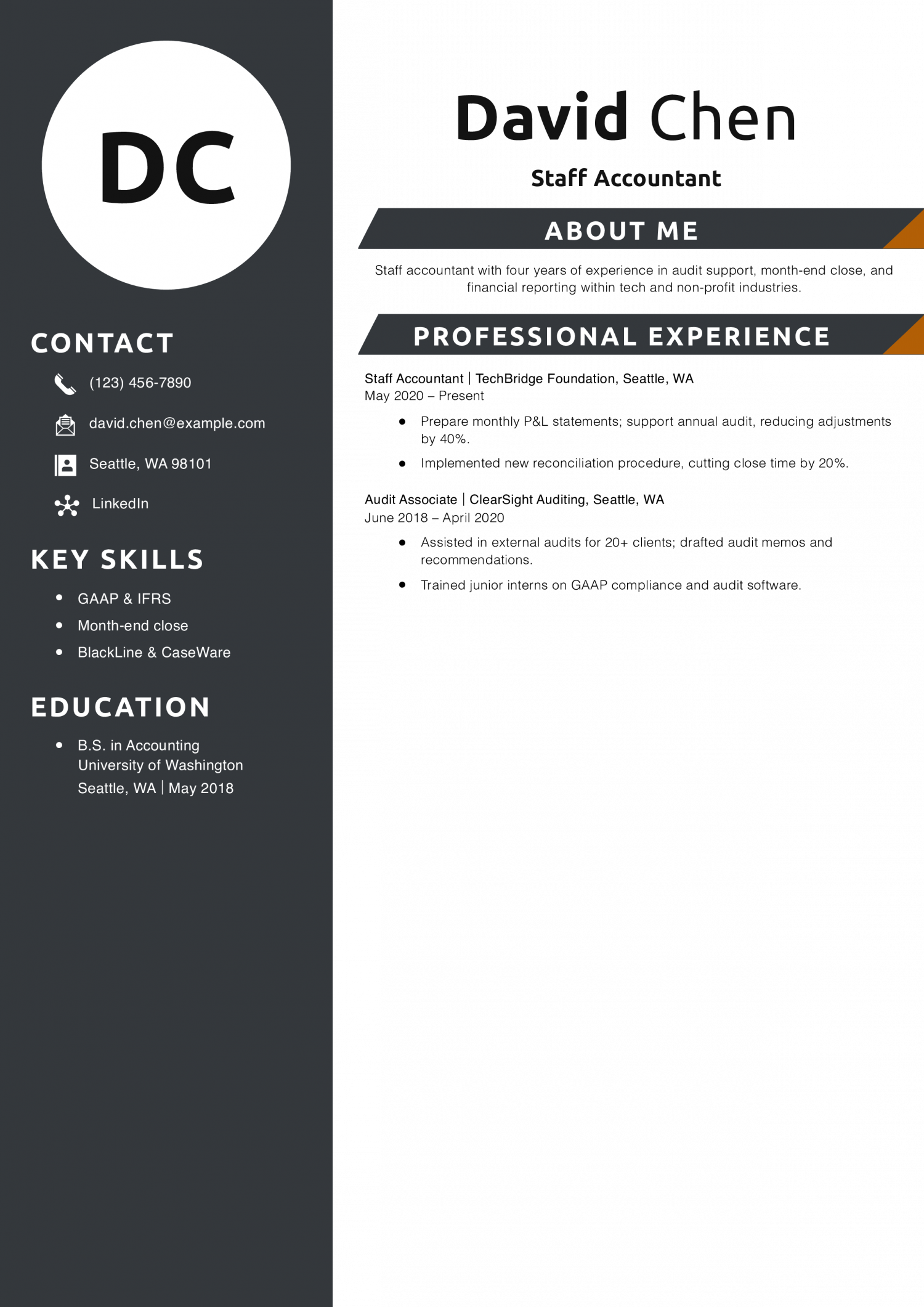
Why This Resume Is a Great Example
David’s resume highlights his dual expertise in audit and reporting, with concrete efficiency gains.
Expert Tip: Emphasize your role in audit success and close‑cycle acceleration. For more tips, see Work Experience on a Resume.
Accounting Clerk Resume Example
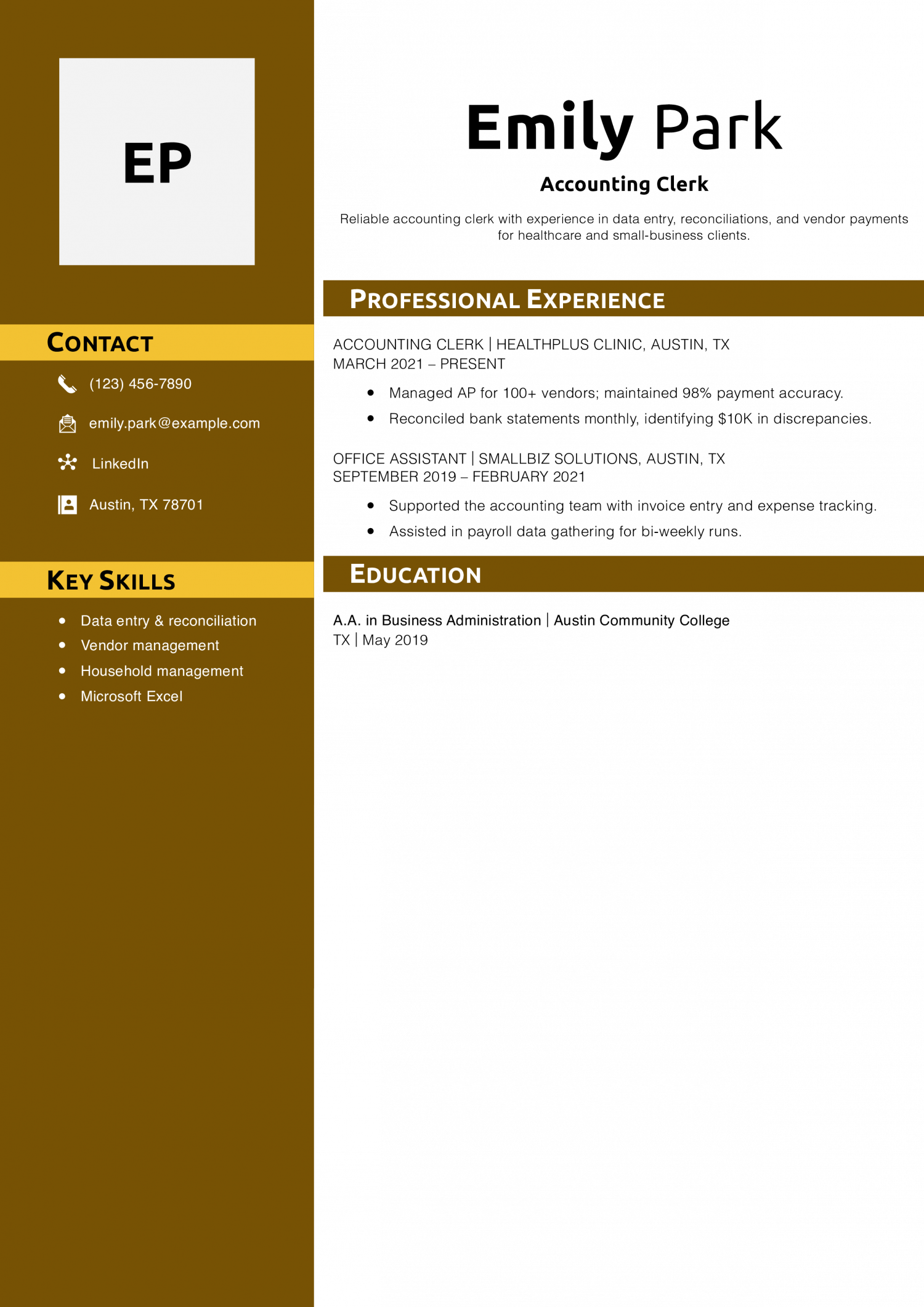
Why This Resume Is a Great Example
Emily’s resume demonstrates her meticulous approach to clerical accounting tasks and error reduction.
Expert Tip: Highlight your accuracy rates and discrepancy resolutions. For more tips, see How to Use Bullet Points on a Resume Effectively.
Junior Accountant Resume Example
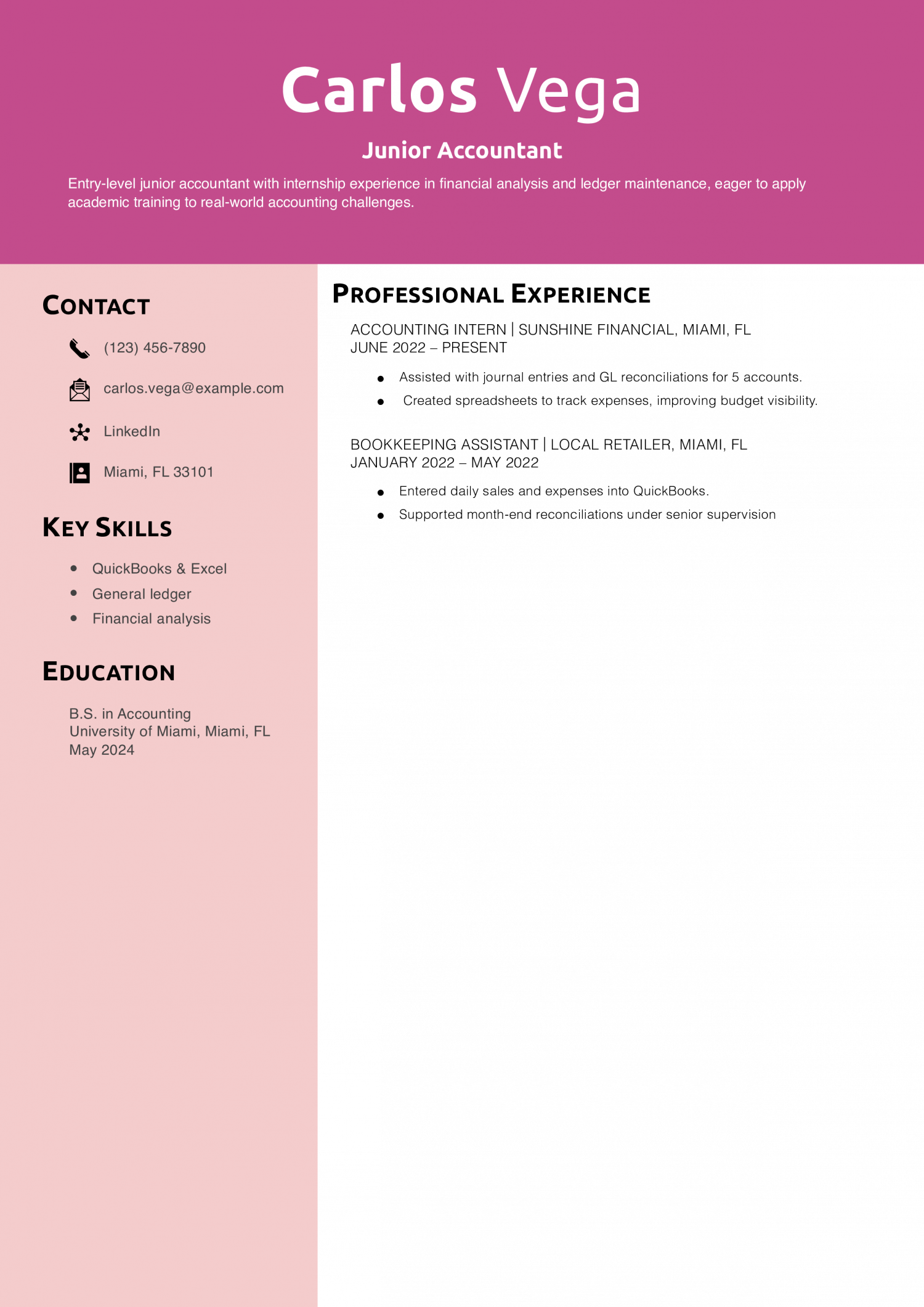
Why This Resume Is a Great Example
Carlos’s resume balances internship duties with tangible contributions to budget tracking and reconciliations.
Expert Tip: Emphasize your software skills and early successes in accuracy. For more tips, see How to Write a Resume with No Experience.
Accounting Clerk / Bookkeeper Resume Example
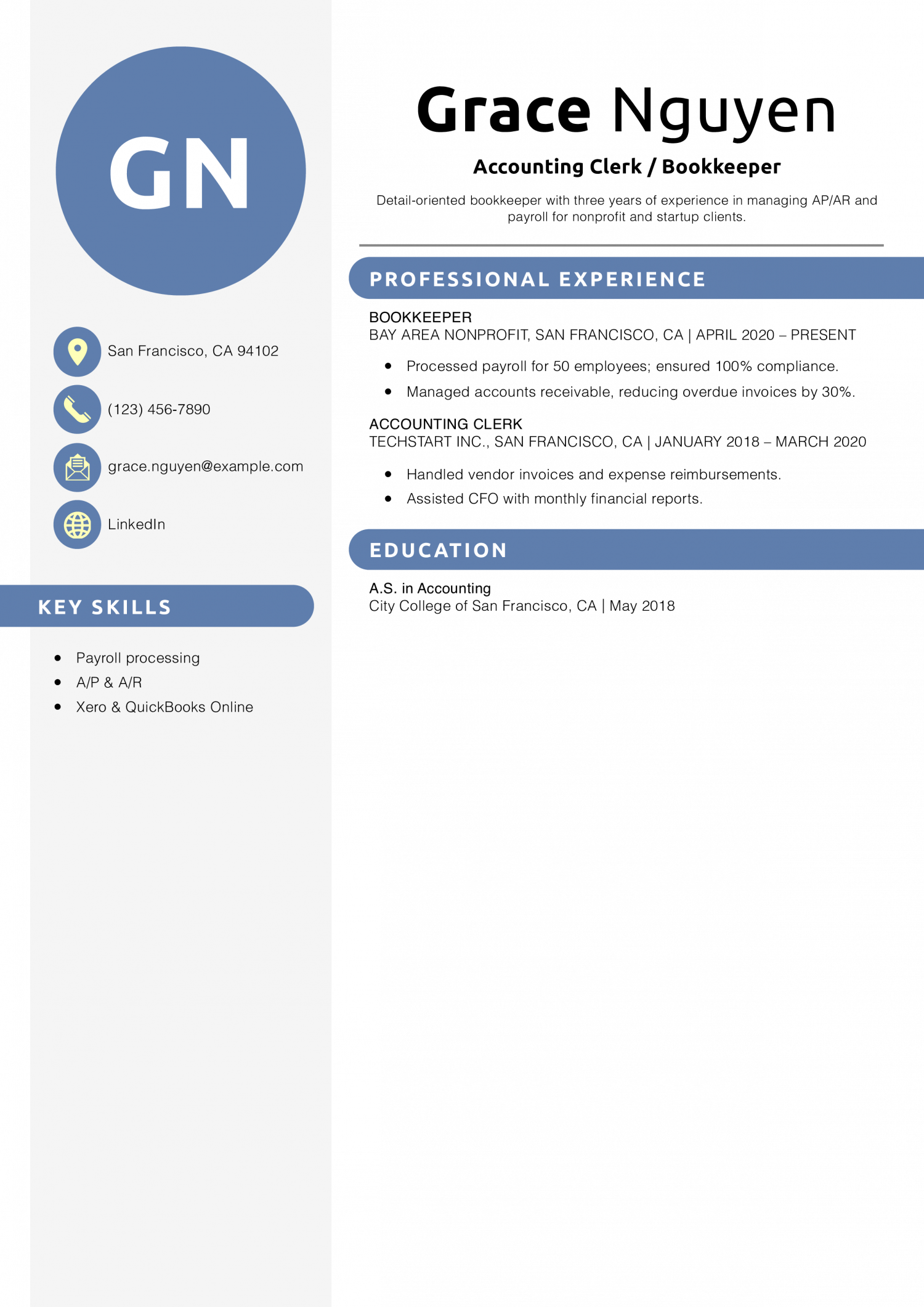
Why This Resume Is a Great Example
Grace’s resume demonstrates her comprehensive bookkeeping skills and measurable impact on collections and payroll.
Expert Tip: Highlight your efficiency in accounts management and compliance. For more tips, see What to Put on a Resume.
Accounting Intern Resume Example
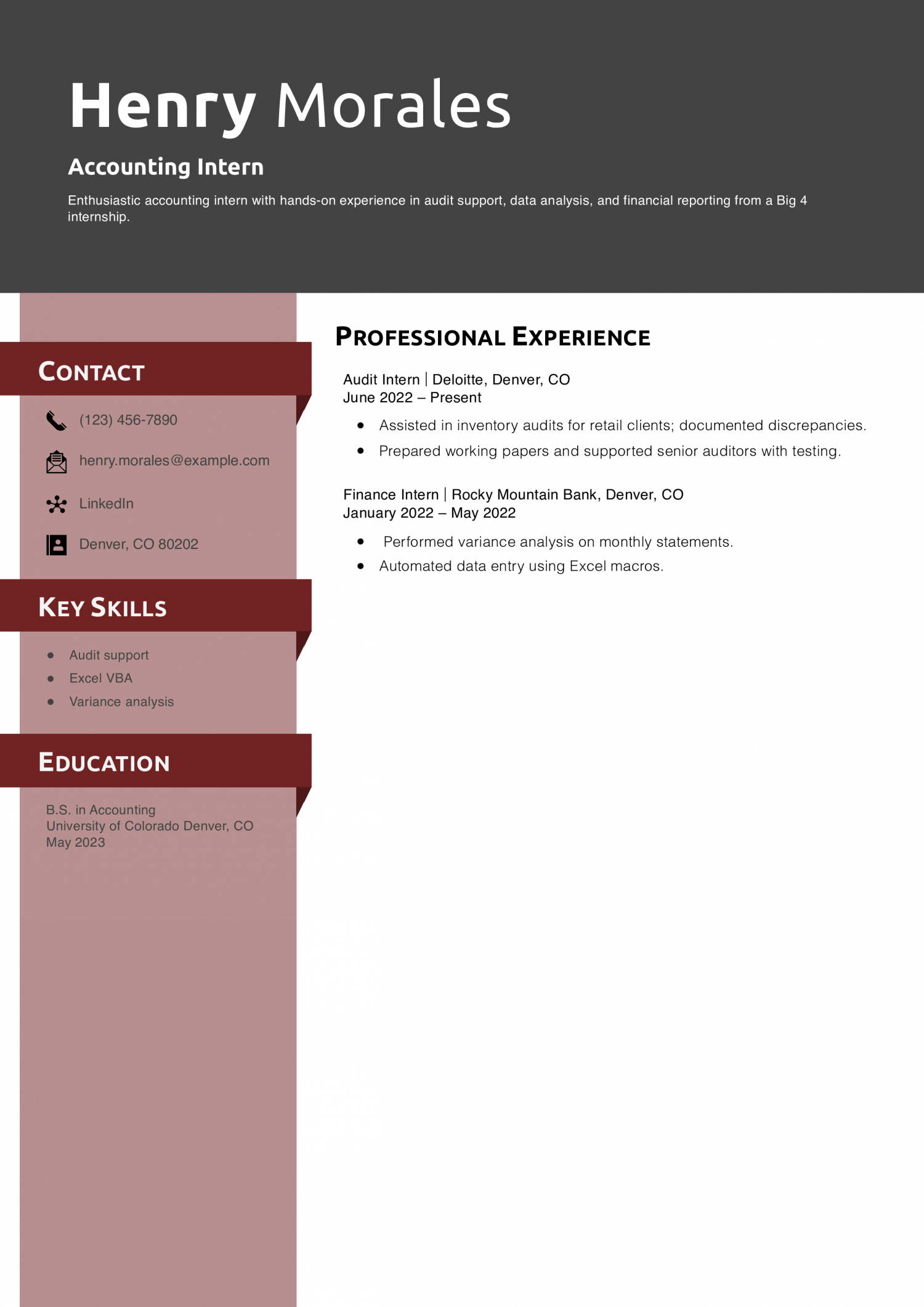
Why This Resume Is a Great Example
Henry’s resume highlights his solid foundation in audit and financial analysis with real‑world internship achievements.
Expert Tip: Highlight your technical contributions to audit efficiency. For more tips, see Resume Objective Examples.
Tax Accountant Resume Example
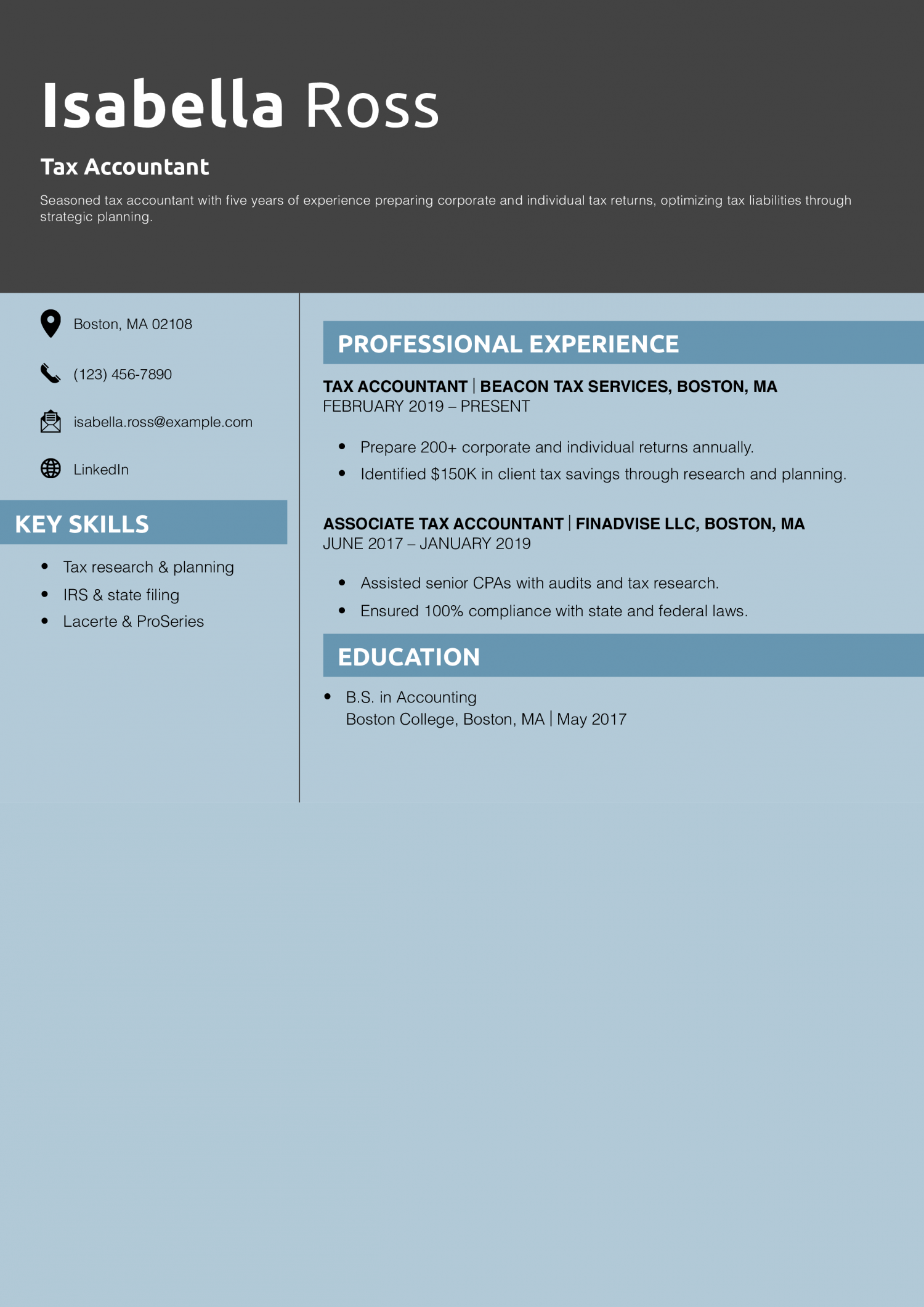
Why This Resume Is a Great Example
Isabella’s resume highlights her ability to drive significant tax savings and maintain complete compliance for clients.
Expert Tip: Quantify your tax optimization achievements. For more tips, see Hard Skills for a Resume.
Cost Accountant Resume Example
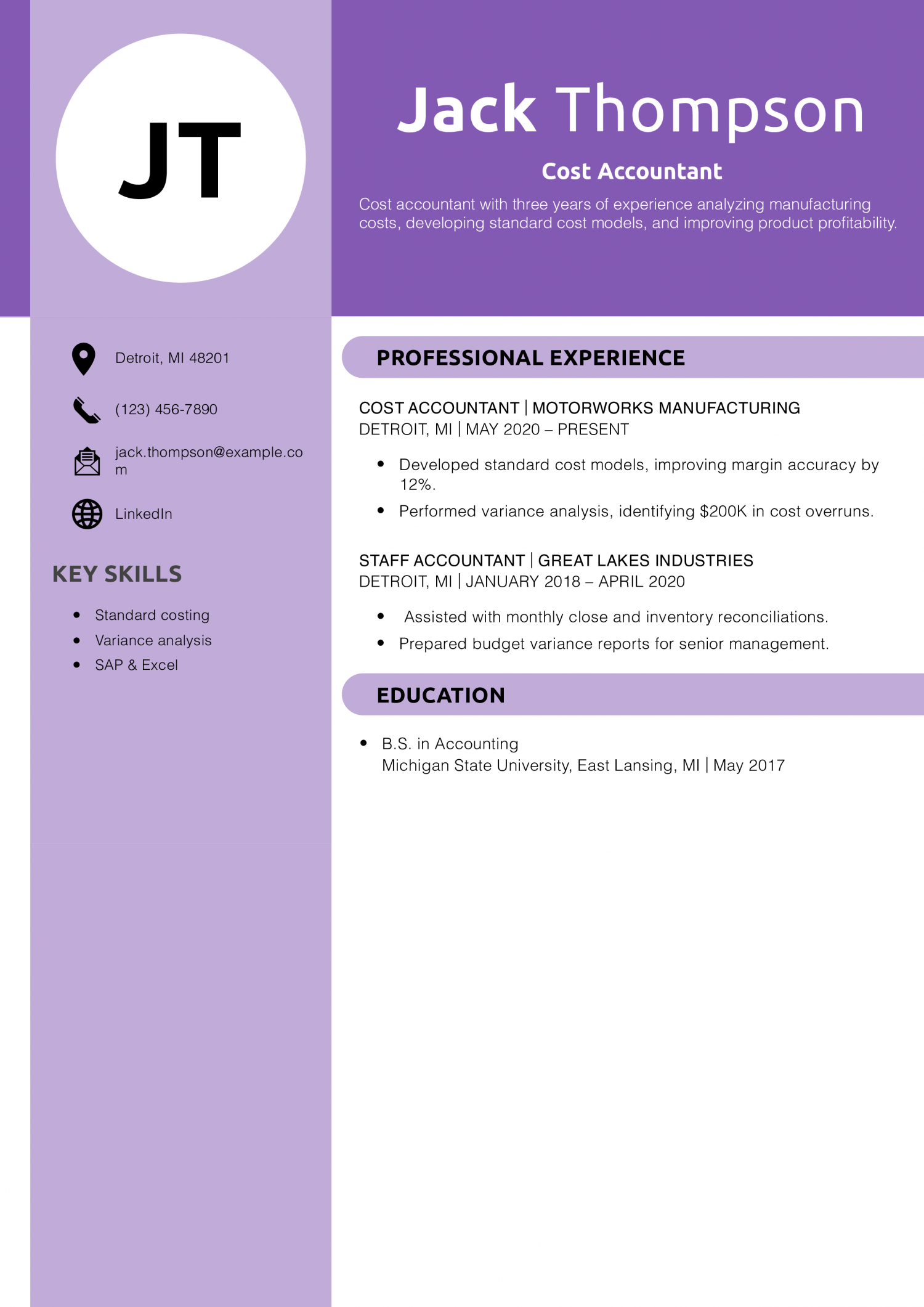
Why This Resume Is a Great Example
Jack’s resume showcases his expertise in cost modeling and his tangible contributions to profitability.
Expert Tip: Emphasize your variance analysis outcomes. For more tips, see Resume Action Words.
Management Accountant Resume Example
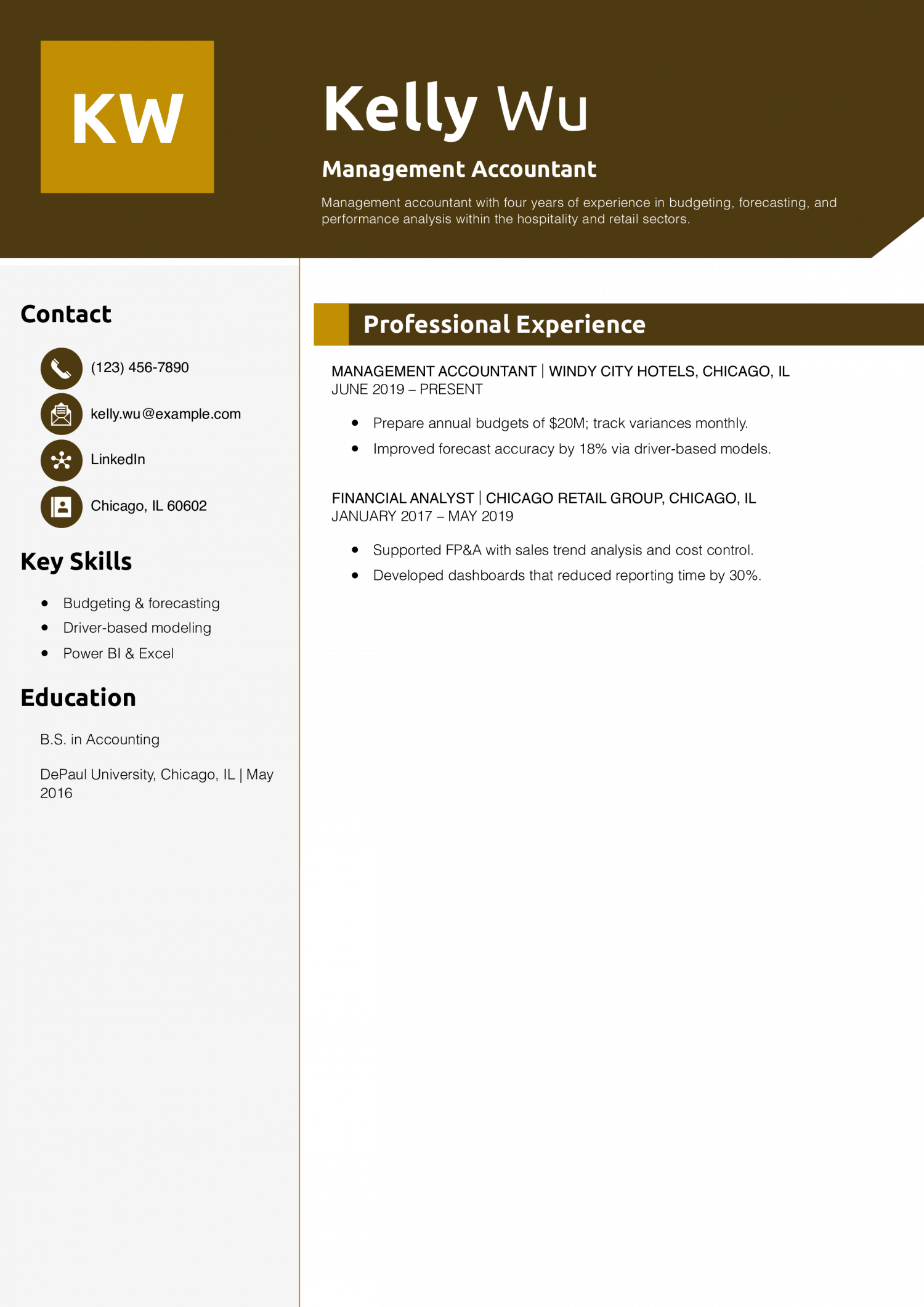
Why This Resume Is a Great Example
Kelly’s resume highlights her strategic budgeting skills and significant forecast accuracy improvements.
Expert Tip: Illustrate your driver‑based modeling results. For more tips, see the Core Competencies Resume.
Audit Associate Resume Example
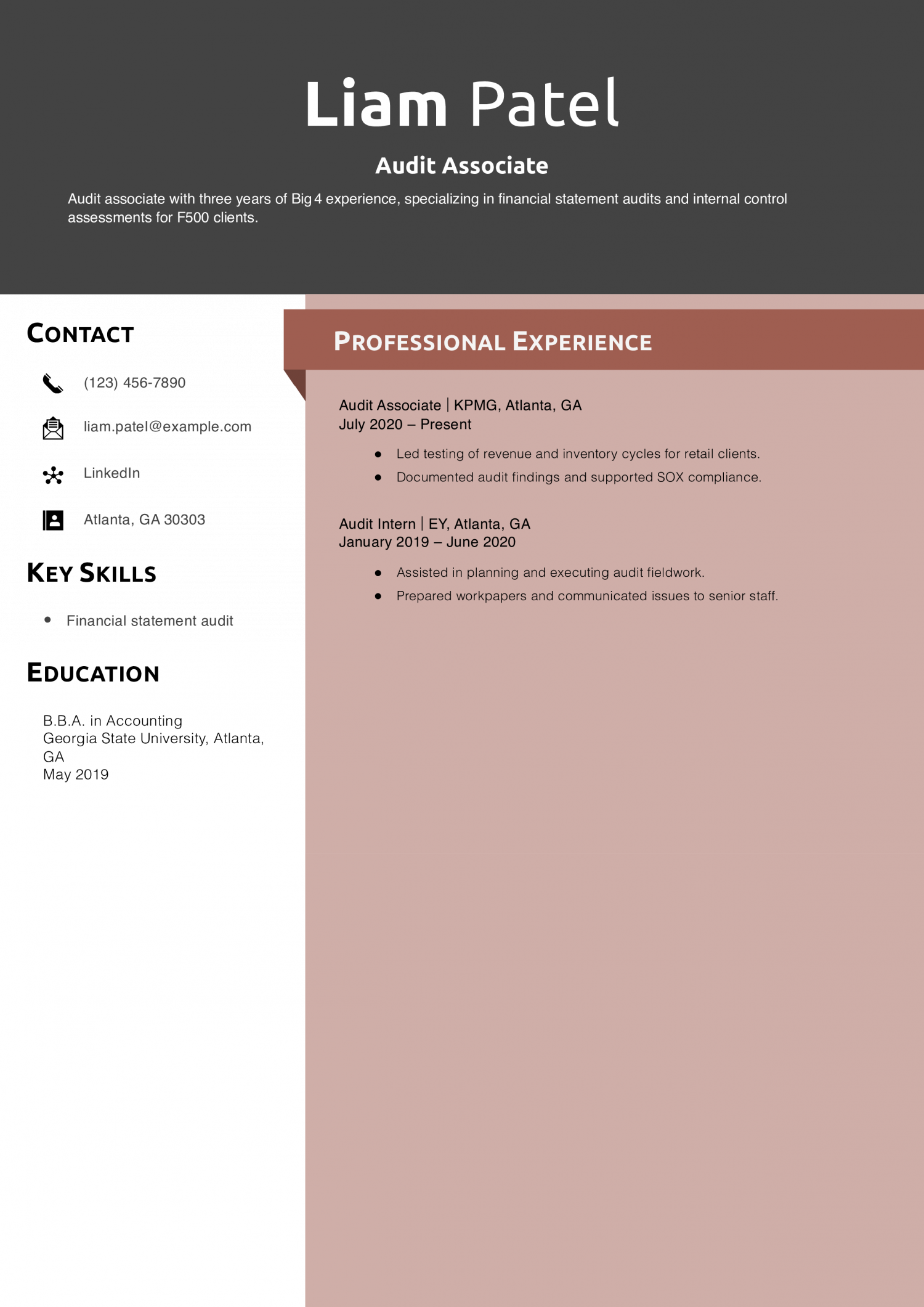
Why This Resume Is a Great Example
Liam’s resume effectively conveys his audit expertise and his role in ensuring regulatory compliance.
Expert Tip: Highlight your SOX and control testing experience. For more tips, see Career Advice: Resume Job Description.
Bookkeeper Resume Example
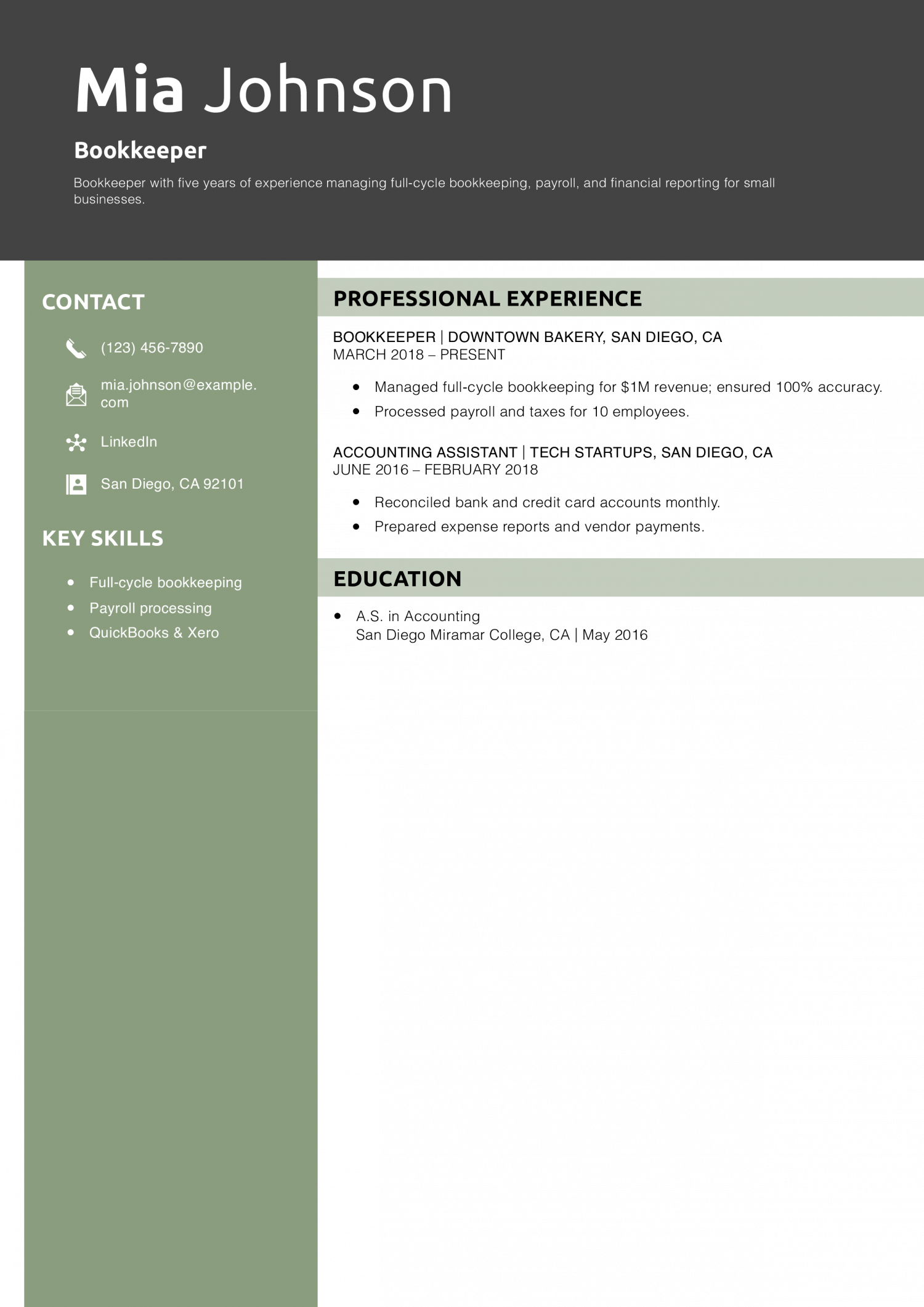
Why This Resume Is a Great Example
Mia’s resume demonstrates her reliability in full‑cycle bookkeeping and payroll accuracy.
Expert Tip: Emphasize your accuracy rates and system proficiencies. For more tips, see Computer Skills for Your Resume.
Financial Reporting Accountant Resume Example
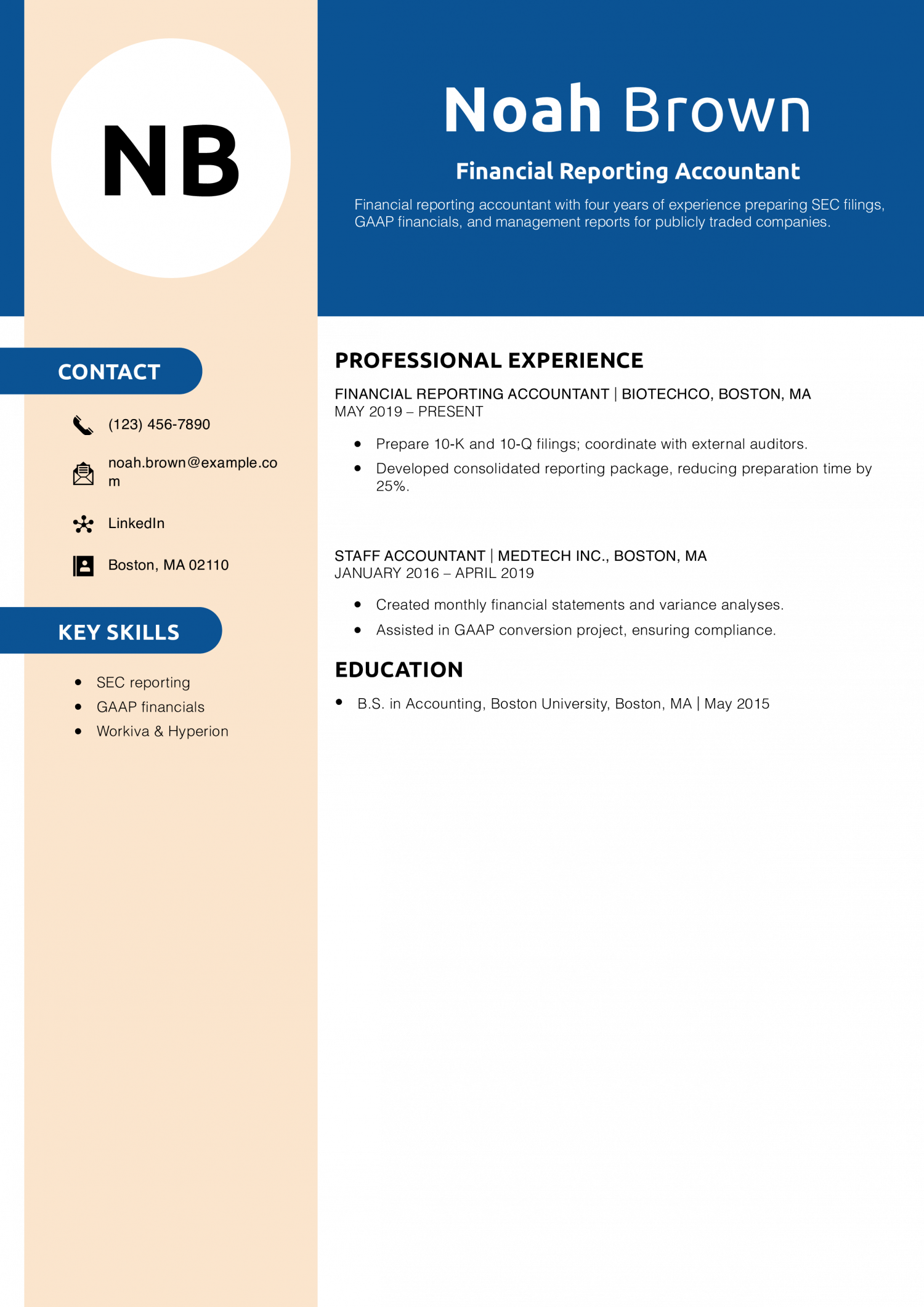
Why This Resume Is a Great Example
Noah’s resume stands out for its SEC reporting expertise and efficiency improvements in consolidation.
Expert Tip: Quantify your reporting cycle improvements to highlight your value. For more tips, see How to List Your Education on a Resume.
Payroll Accountant Resume Example
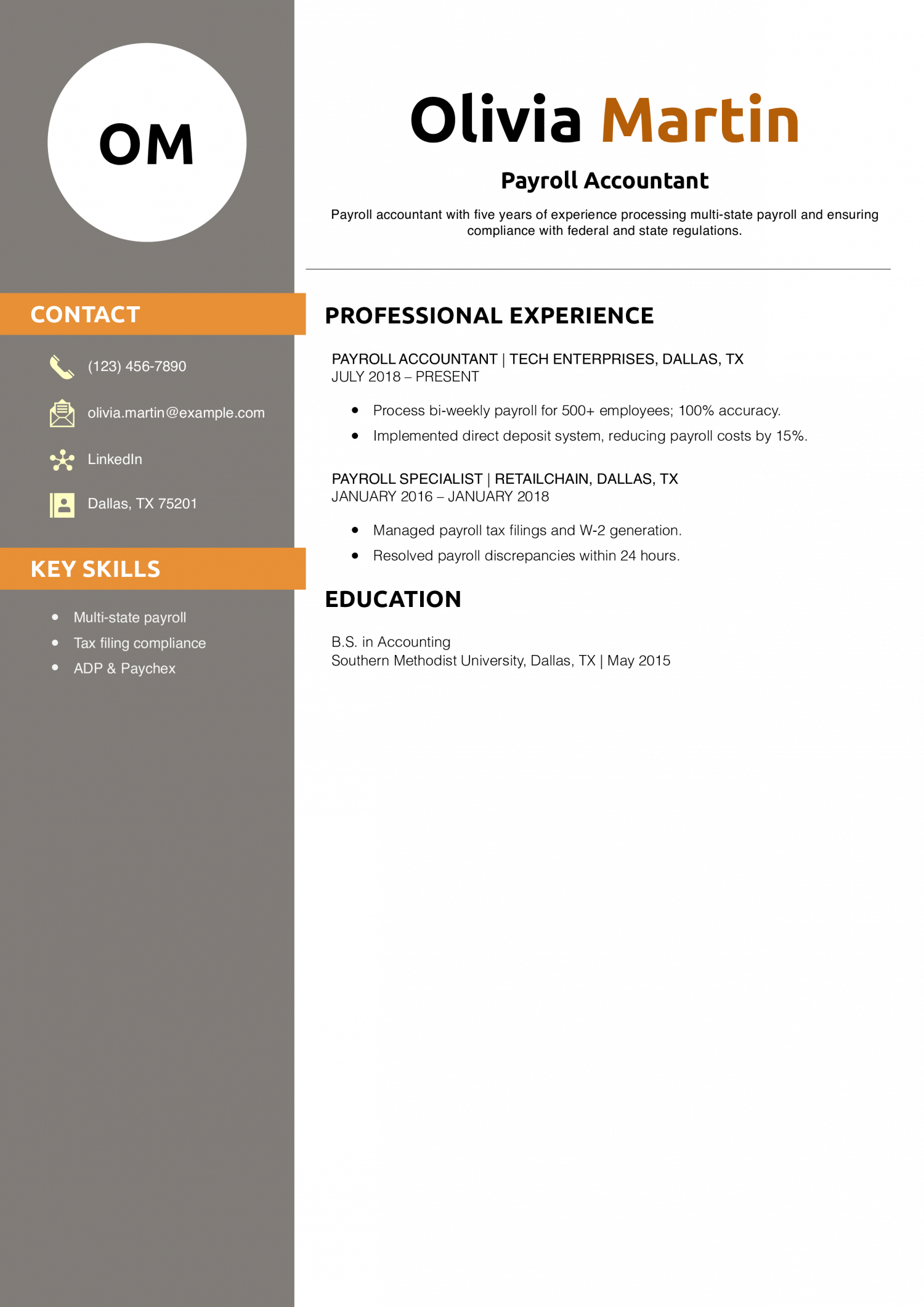
Why This Resume Is a Great Example
Olivia’s resume effectively highlights her payroll accuracy and cost‑saving initiatives.
Expert Tip: Emphasize your compliance record and system implementations. For more tips, see Should You Put Your Address on Your Resume?
Forensic Accountant Resume Example

Why This Resume Is a Great Example
Ethan’s resume demonstrates his deep forensic expertise and courtroom‑ready reporting.
Expert Tip: Quantify your asset recoveries to highlight investigative impact. For more tips, see Extracurricular Activities for a Resume.
Tax Accounting Manager Resume Example
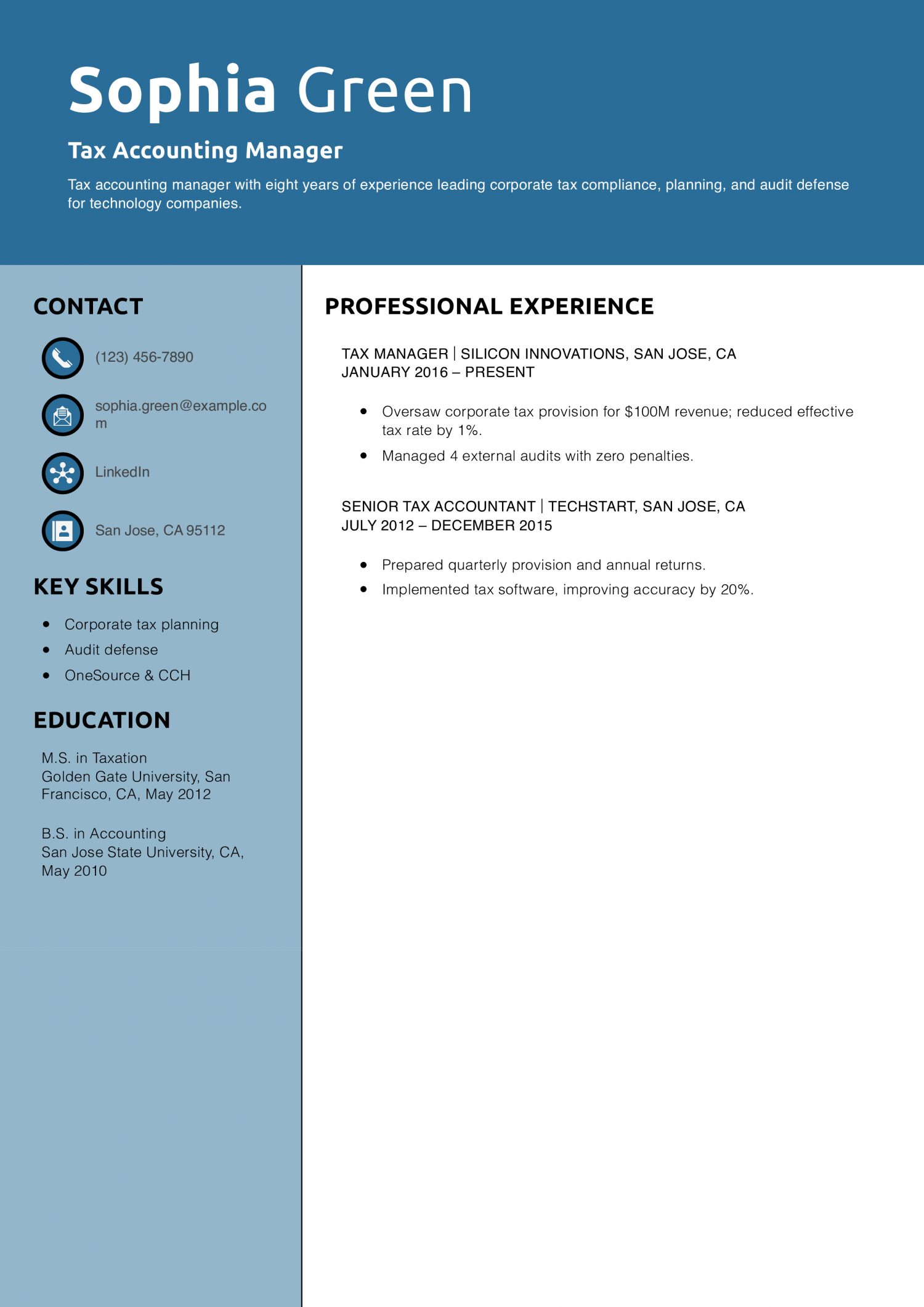
Why This Resume Is a Great Example
Sophia’s resume highlights her tax leadership and successful audit outcomes.
Expert Tip: Emphasize your audit defense record and tax rate improvements. For more tips, see Career Advice: Leadership Skills for Resumes with Examples.
Corporate Accountant Resume Example
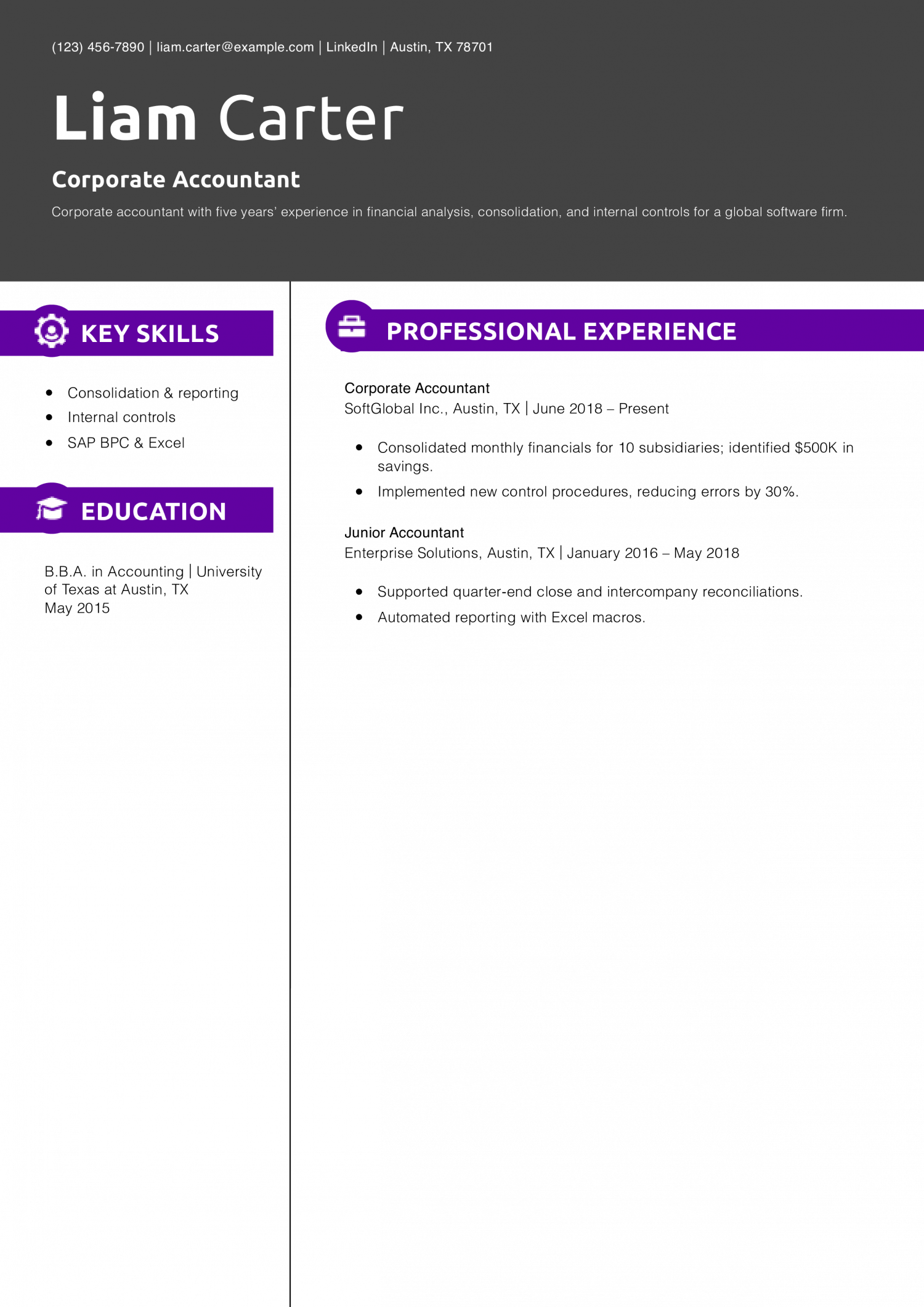
Why This Resume Is a Great Example
Liam’s resume shows his impact on consolidation efficiency and strong control implementation.
Expert Tip: Use savings metrics and error‑reduction rates to highlight your value. For more tips, see How to Build a Professional Resume.
FP&A Analyst Resume Example
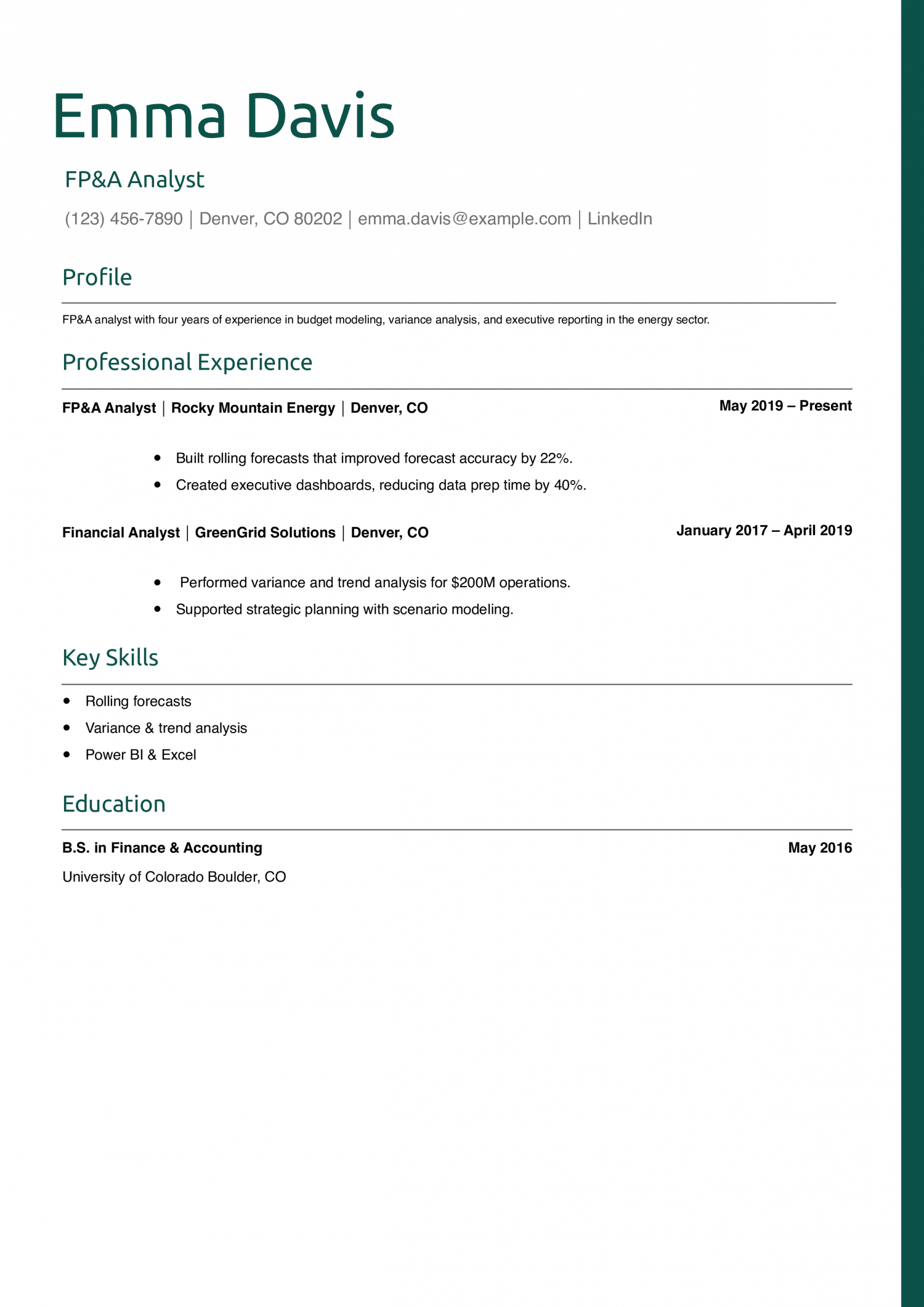
Why This Resume Is a Great Example
Emma’s resume demonstrates her strategic planning contributions and dashboard efficiencies.
Expert Tip: Quantify your forecast accuracy and prep‑time reductions. For more tips, see How to List Skills on a Resume.
How To Write an Accountant Resume Example
Using a resume template can help you write an effective accountant resume. Your resume should include these sections:
- Contact information
- Profile
- Key skills
- Professional experience
- Education and certifications
1. Share your contact information
Include a header with your full name, phone number, email address, location, and a link to your online professional profile. Ensure your contact information is current so potential employers can contact you for an interview.
Example
Your Name
(123) 456-7890
[email protected]
City, State Abbreviation Zip Code
LinkedIn
2. Summarize your accountant qualifications in a dynamic profile
In about two to three sentences, summarize your professional background, and experience as an accountant. Use this section to make a strong, eye-catching introduction. Highlight your unique value proposition and integrate keywords from the job description to show you’re a good match for the role.
For instance, if the employer emphasizes a particular skill set, such as cost analysis or financial forecasting, provide a brief example of how you’ve excelled in that area. Or, maybe you’re applying for an accountant position in a specific industry, and you have relevant experience. Mention sector-specific regulations or accounting systems you’re familiar with.
Senior-Level Profile Example
Finance leader with over a decade of experience guiding tech companies through rapid scaling. Recognized for driving financial agility in high-growth Software as a Service (SaaS) environments. Leverages advanced analytics and modeling techniques to optimize revenue growth and stakeholder value.
Entry-Level Profile Example
Accounting professional with two years of experience optimizing financial processes and ensuring ironclad compliance across multi-state operations. Combines analytical skills with advanced software proficiency to deliver actionable financial insights and exemplary audit results.
3. Add your accountant experience with compelling examples
Whether you’re a junior accountant or a senior-level leader, your work history section should outline your professional growth and achievements. It’s the audit trail of your career, providing clear evidence of your financial stewardship. Start with your latest position and work backward, using bullet points, action verbs, and numbers to communicate the measurable impact you had.
In today’s digital world, you rely on technology to help manage, analyze, and report financial data. So, remember to highlight your proficiency with relevant digital tools as you describe your accomplishments. Focus on accounting software and systems specifically mentioned in the job description.
Senior-Level Professional Experience Example
Senior Financial Controller, CloudScale Solutions, Philadelphia, PA
January 2020 – present
- Oversee financial operations for a SaaS portfolio with $75 million in annual recurring revenue (ARR)
- Lead quarterly financial reviews for top 10 accounts and provide strategic insights
- Mentor a team of five junior accountants, resulting in a 40% reduction in audit adjustments and a three-day improvement in month-end close time
- Reduced forecast variance from 12% to 3% by implementing advanced modeling techniques with Anaplan
- Mitigated $5 million in potential revenue leakage with the development of a comprehensive financial risk assessment framework
Entry-Level Professional Experience Example
Junior Accountant, Goodwill Industries, Minneapolis, MN
June 2023 – present
- Process an average of 200 accounts payable and receivable entries per month
- Prepare and review over 50 journal entries for month-end close
- Partner with human resources and payroll to reconcile medical deductions and benefits for more than 500 employees
- Reconciled $50,000 in unclaimed property filings for three state jurisdictions
- Contributed to three successful internal audits, ensuring 100% compliance with generally accepted accounting principles (GAAP) and organizational policies
Resume writer’s tip: Quantify your experience
Data, metrics, and monetary figures help to quantify your experience and should be used to measure your past success. Companies are looking for accountants who will drive results and revenue. Illustrate your worth by including examples of specific accomplishments and outcomes achieved throughout your career.
Here’s an example:
Do
- “Prepare 12 quarterly financial statements and key performance indicator (KPI) reports using Power BI to visualize performance across global luxury markets”
Don’t
- “Generated financial reports to assess performance”
Resume writer’s tip: Tailor your resume for each application
Just like you would adjust journal entries for different accounting standards, tailoring your resume ensures it’s relevant to every role you apply for. This is the best way to demonstrate that you understand the potential employer’s needs. Connect the skills, experiences, and qualifications required with those you already have, and adjust your resume accordingly.
For example, imagine you’re applying for a tax accountant position. You would emphasize any experience with tax preparation software, knowledge of recent law changes, and success identifying tax savings. If they’re looking for someone familiar with data visualization tools like Tableau, mention any proficiency with that software and how you utilized it to achieve results.
What if you don’t have experience?
If you lack experience in the accounting field, focus on more than your skills alone. Your resume should highlight academic projects, bookkeeping roles, and financial responsibilities you managed in other fields or jobs. Also include skills gained from any volunteer work, such as serving as treasurer for a nonprofit organization or managing finances for community events.
Have you passed any parts of the Certified Public Accountant (CPA) exam? That would be seen as a major plus on your resume. Even online courses in specific accounting skills can differentiate you. Proficiency in software like Excel is a baseline, and anything additional in QuickBooks or enterprise resource planning (ERP) systems would be seen as a great benefit.
4. Include accounting-related education and certifications
List any relevant education and certifications you’ve received to show you’re qualified to practice as an accountant. Be sure to include the title of the degree or certificate earned, the institution’s name, and the completion date.
You can also list continuing education courses or professional development programs you’ve completed. If you work in an industry such as health care or government, specific certifications in those sectors can significantly boost your credibility and appeal.
Education
Template:
[Degree Name]
[School Name], [City, State Abbreviation] | [Graduation Year]
Example:
Bachelor of Science (B.S.) in Accounting
University of Syracuse, Syracuse, NY | June 2015
Certifications
Template:
[Certification Name], [Awarding Organization], [Completion Year]
Example:
Certified Public Accountant (CPA), New York State, 2015
5. Include a list of skills and proficiencies related to accounting
Your resume should include accounting skills that demonstrate your strengths in the profession. Instead of including every skill you can think of, align with those found in the job description to show you’re an ideal candidate for the position. Hiring managers can quickly assess your professional “assets” and immediately determine if you meet the job requirements. The lists below provide examples of common hard and soft skills you may wish to include on your resume.
| Hard Skills | |
|---|---|
| Accounts payable/receivable management | Advanced Excel modeling |
| Audit planning and execution | ERP system implementation |
| Foreign currency translation | Internal control design |
| Mergers and acquisitions | Transfer pricing analysis |
| Soft Skills | |
|---|---|
| Client relationship management | Complex data simplification |
| Financial data visualization | Interdepartmental budget mediation |
| Risk tolerance assessment | Stakeholder management |
| Strategic financial storytelling | Tax law interpretation |
Resume writer’s tip: Use strong action verbs
Action verbs add impact to your experience section, but it’s easy to run short during the resume-building process. These words help you avoid redundancy and overusing words like “accomplished” or “assisted.” When writing your accountant resume, use concise language, avoid the passive voice, and vary your language by using action verbs like these:
| Action Verbs | |
|---|---|
| Analyze | Estimate |
| Examine | Forecast |
| Manage | Organize |
| Prepare | Reconcile |
| Report | Verify |
How To Pick the Best Accountant Resume Template
Accountants know how important financial statement templates are to present a clear, concise report for stakeholders. A resume template offers similar benefits for your job application. It provides an organized framework, helps you save time, and reduces the risk of errors, drawing the focus to your content. For accountants, a modern resume template is a smart choice with clear sections, bullet points, classic colors, and easy-to-read fonts.
Accountant Text-Only Resume Examples and Templates
Frequently Asked Questions: Accountant Resume Examples and Advice
Your Accountant CV should include a strong profile summary that emphasizes your specializations and key skills. Highlight any specific accomplishments that show your ability to impact the company, such as saving money, improving processes, or leading teams. Tailor the skills section to match the requirements of the job you're applying for to increase your chances of being noticed.
According to O*NET OnLine, job seekers applying for accountant and auditor positions can expect a moderately competitive market. With job growth expected to remain about average over the next 10 years, you'll need a resume that can help you stand out from a talented work pool. Using keywords throughout your application is a great way to do this.
This isn't a copy-and-paste situation, but rather a keen awareness of what employers need. Study the job description and identify specific skills, qualifications, and software proficiencies. For example, if the job requires "experience with NetSuite," avoid using a general statement such as "familiar with ERP systems." Instead, specify how you've used NetSuite and what you accomplished as a result.
Accountants will benefit most from a reverse chronological resume format. It's like presenting your year-over-year performance, demonstrating growth, stability, and an increase in responsibilities. While the skills list isn't a prominent feature of this style, the idea is to show your accounting skills in action with a robust work history section. Hiring managers are most interested in your past experience because this informs how you could benefit their future.
Include a cover letter with your resume
After finalizing your resume, write an accompanying cover letter. Explain the story behind the bullet points of your resume and provide context for key moments from your accounting career. Think of it as a qualitative analysis for potential employers, giving a clear picture of why you want the job and how your unique value can benefit their organization.
Check Out Related Examples
Resume Templates offers HR approved resume templates to help you create a professional resume in minutes. Choose from several template options and even pre-populate a resume from your profile.

